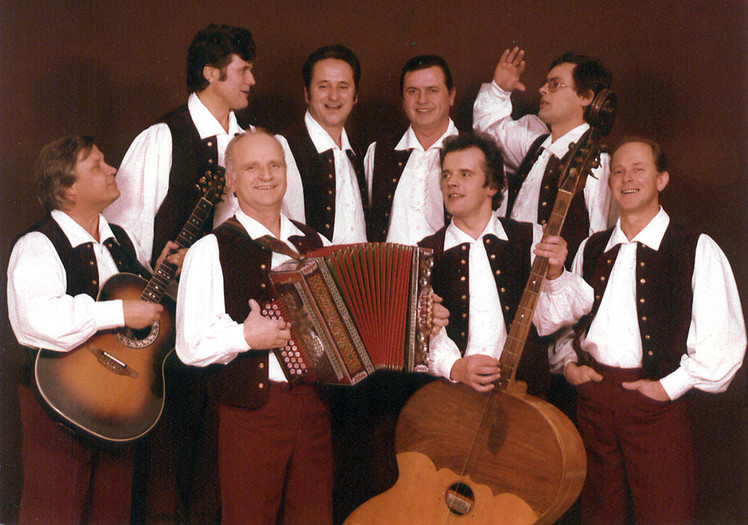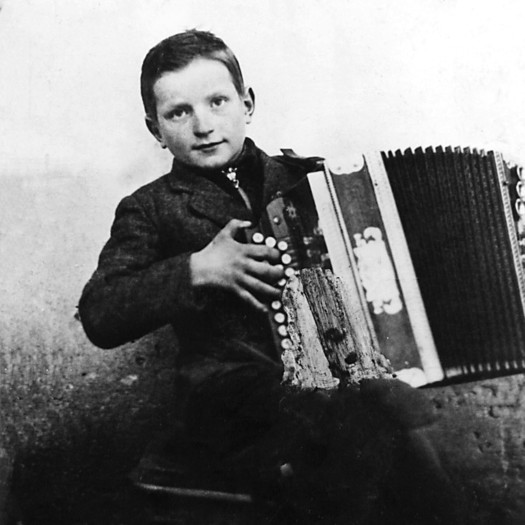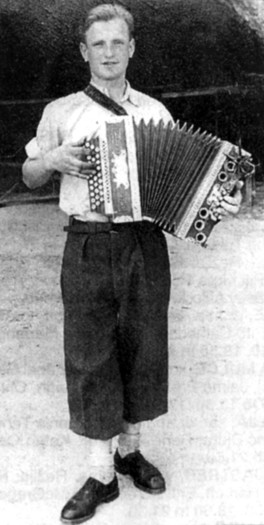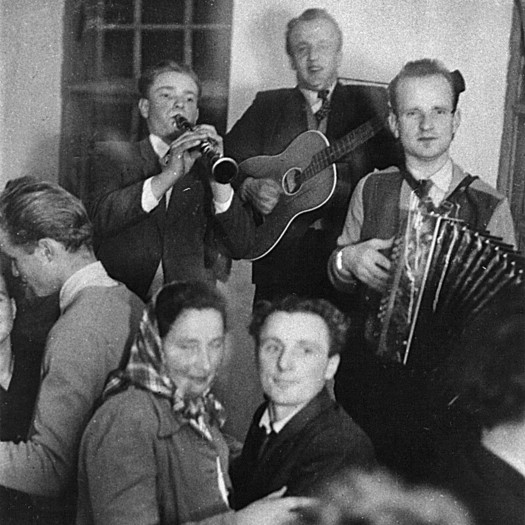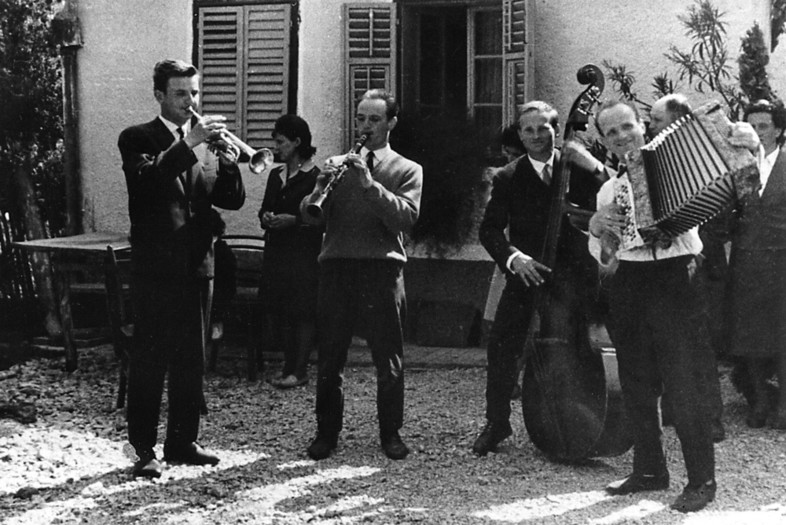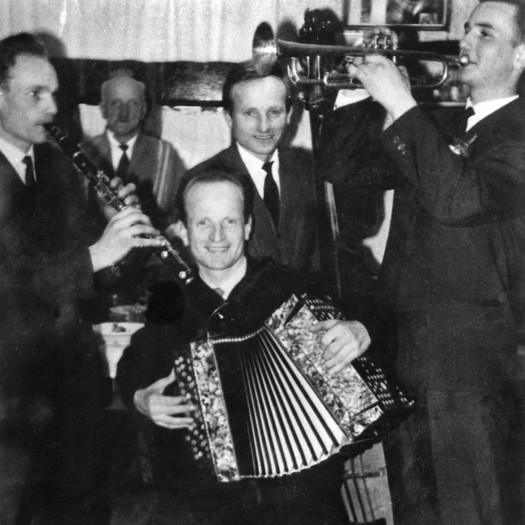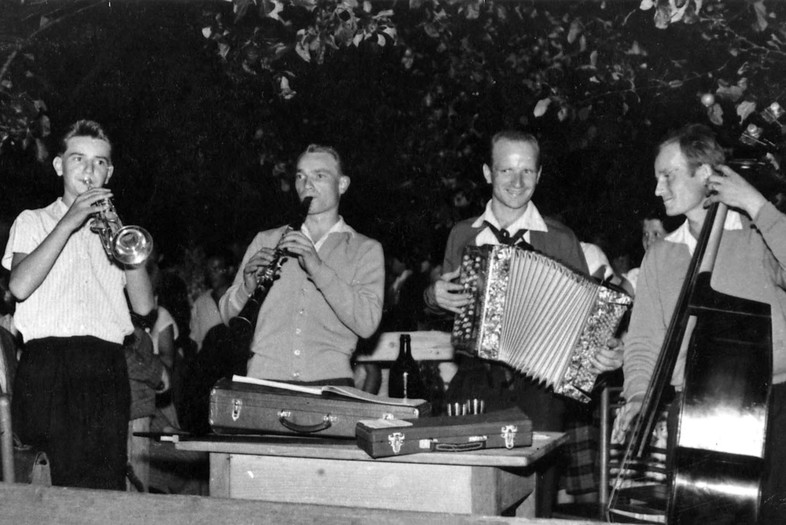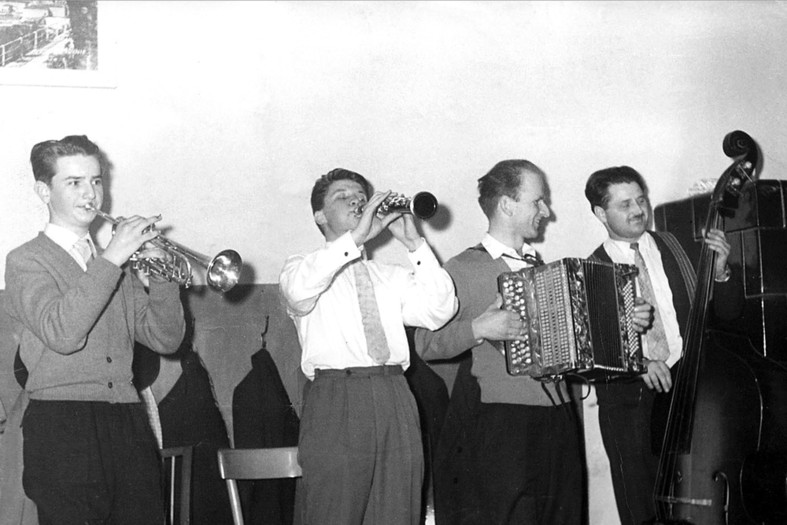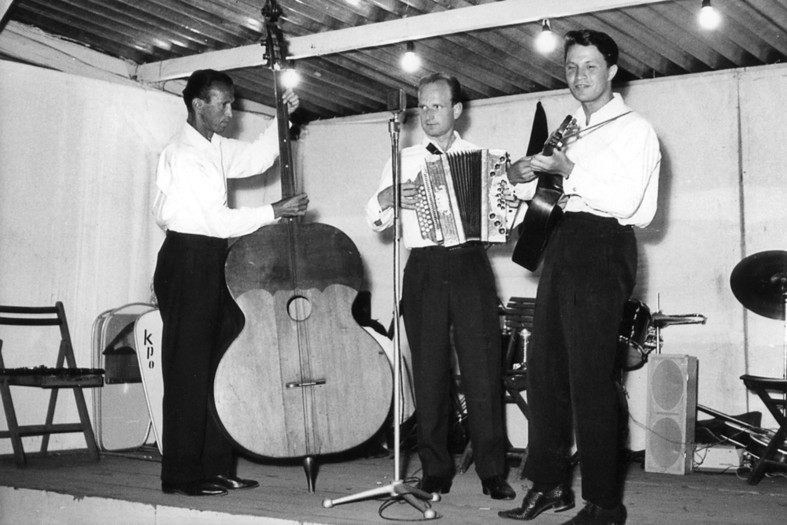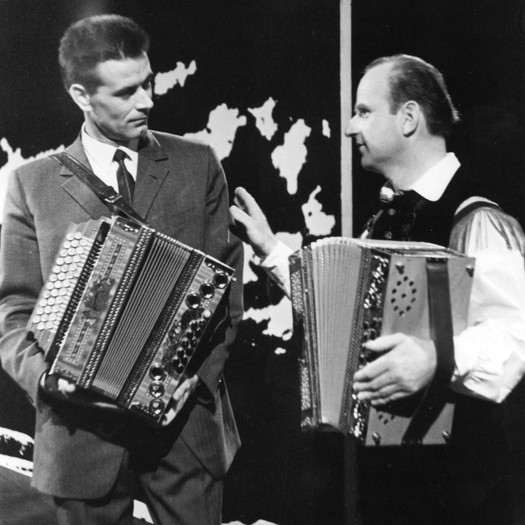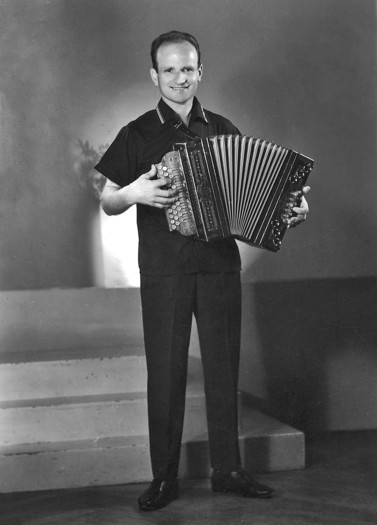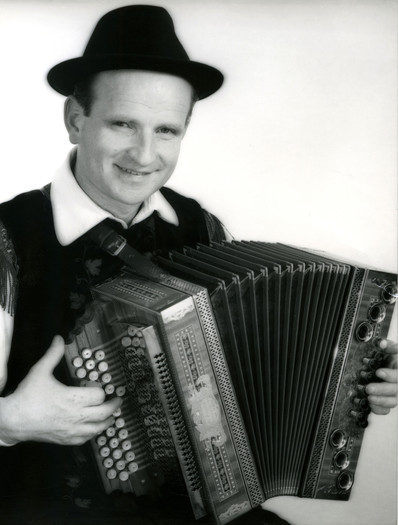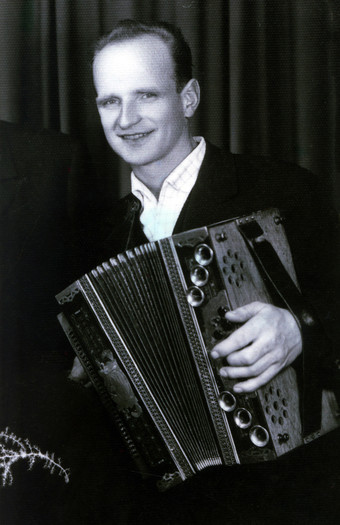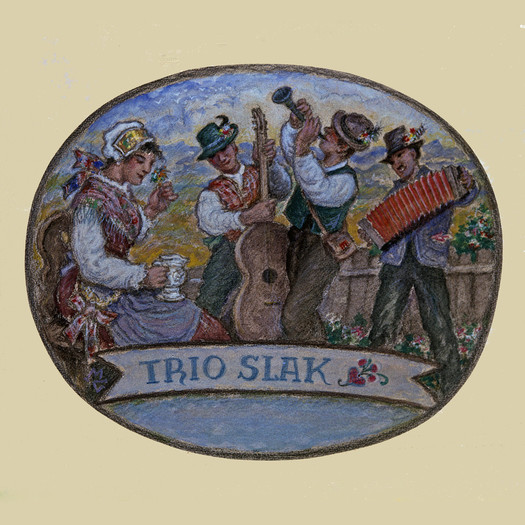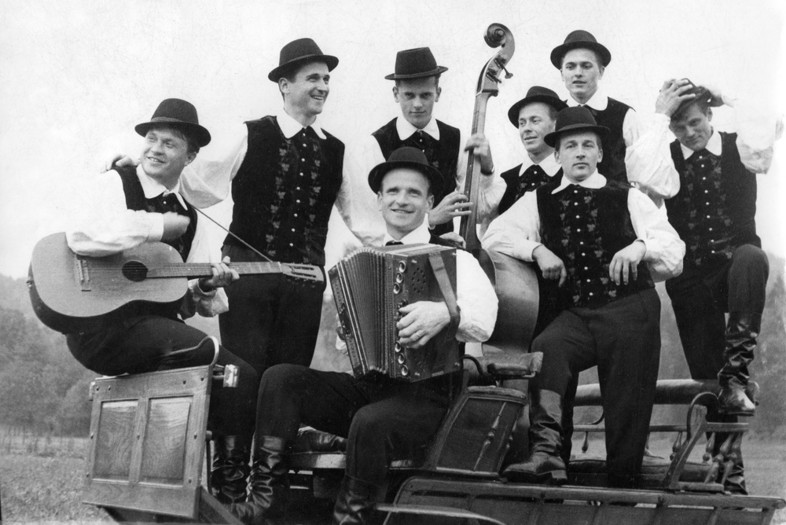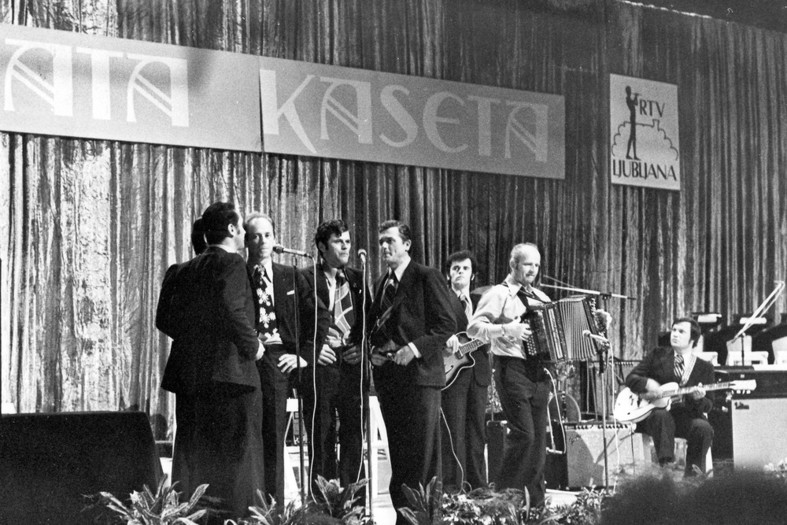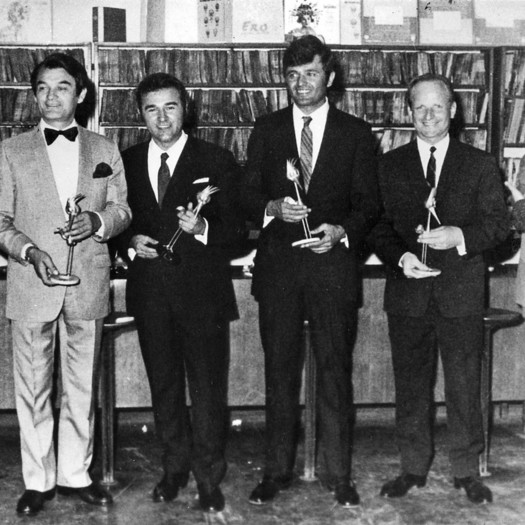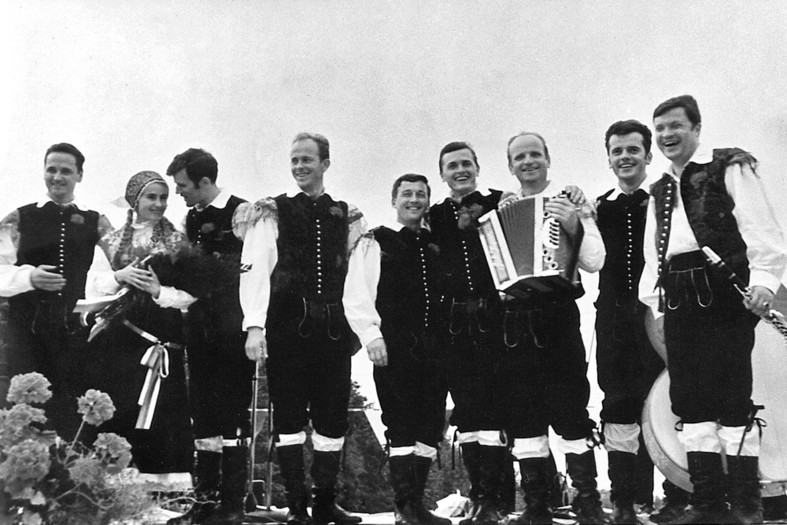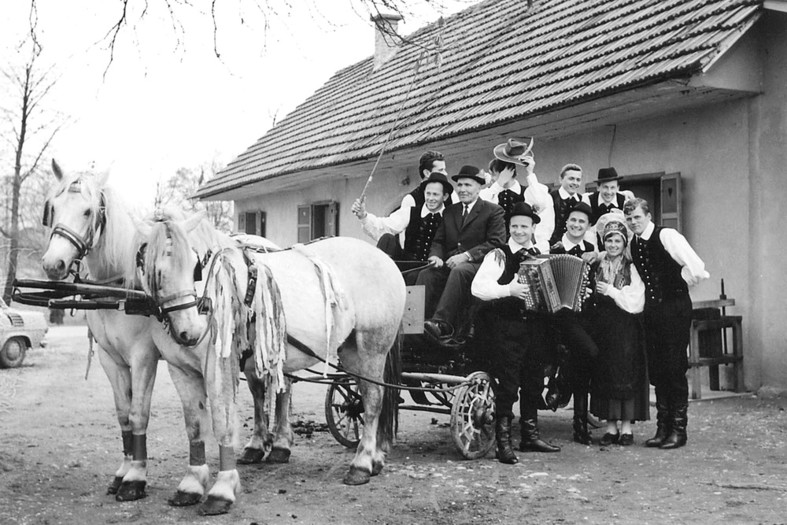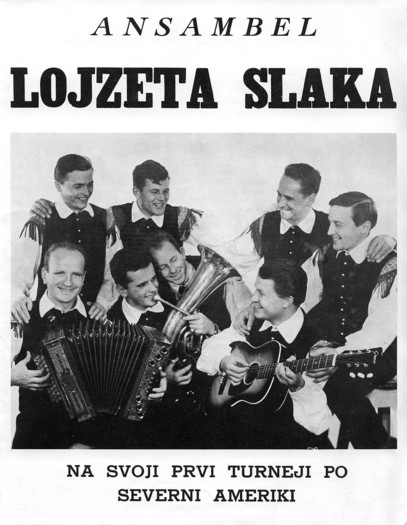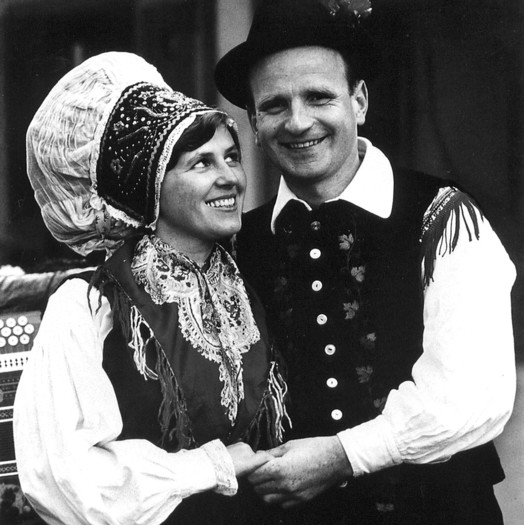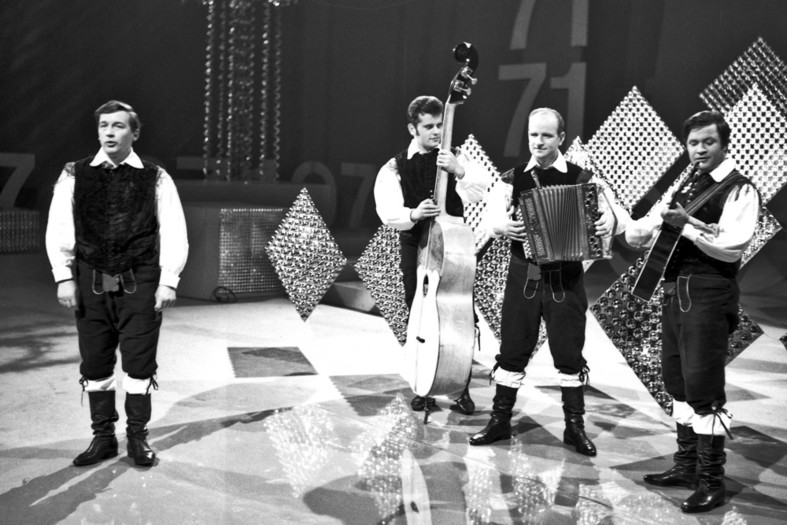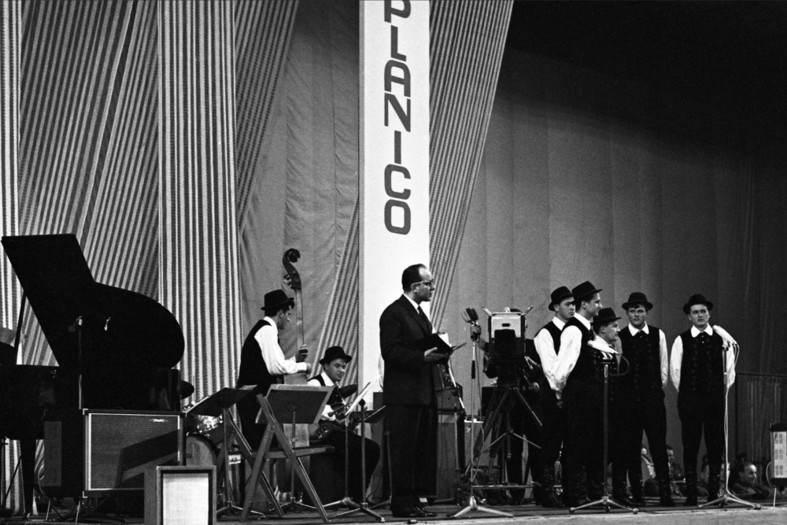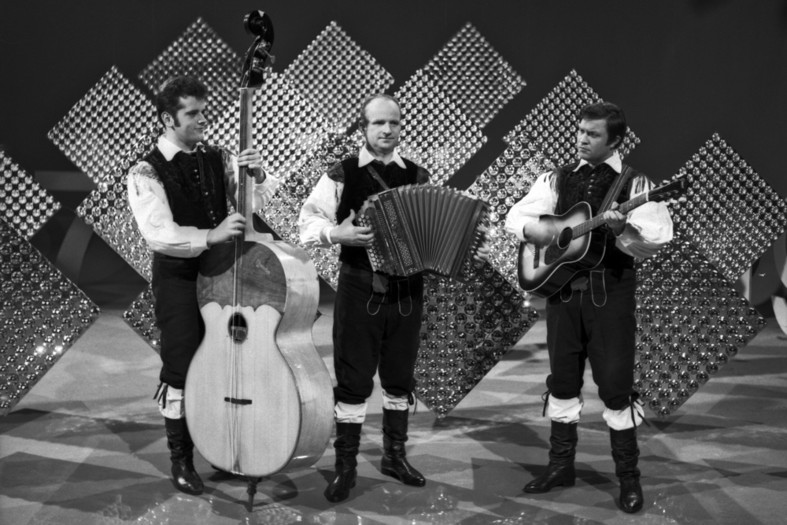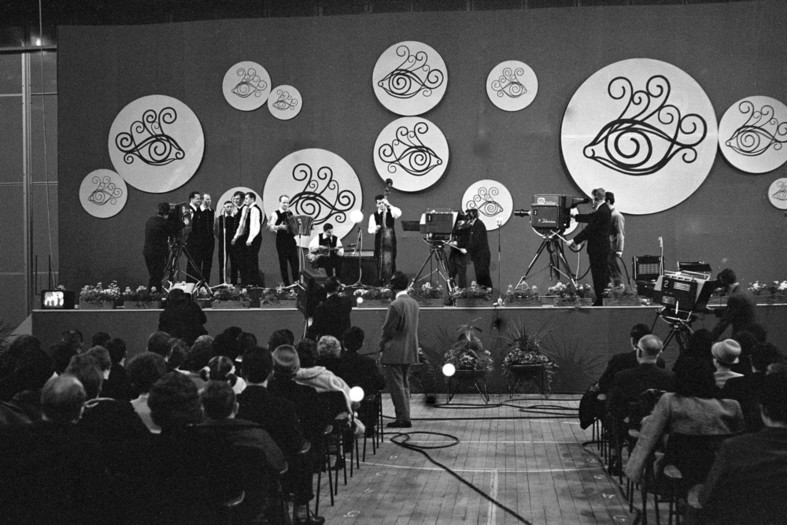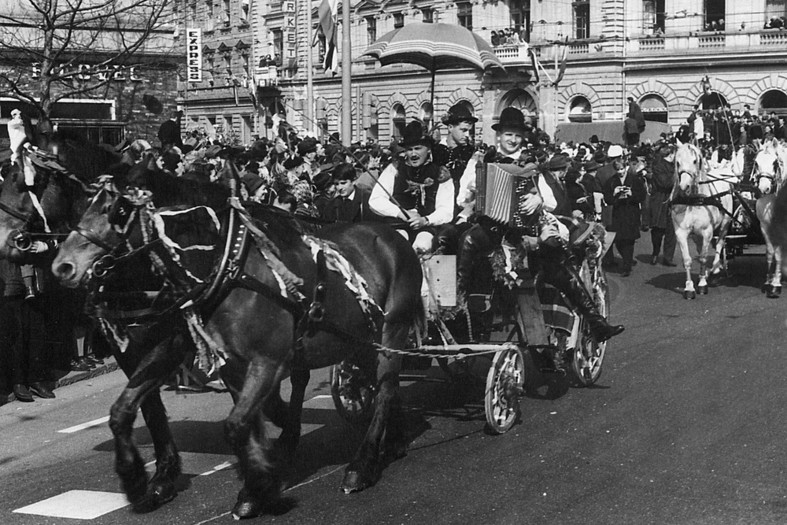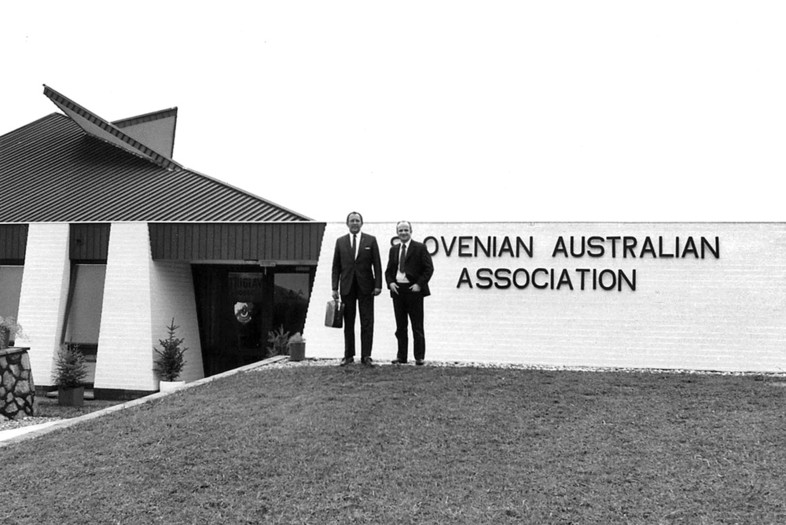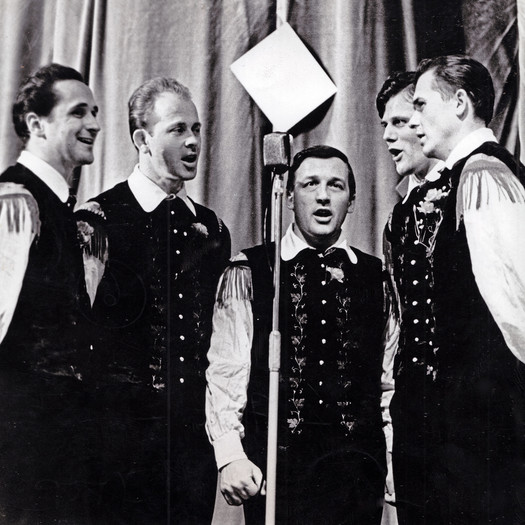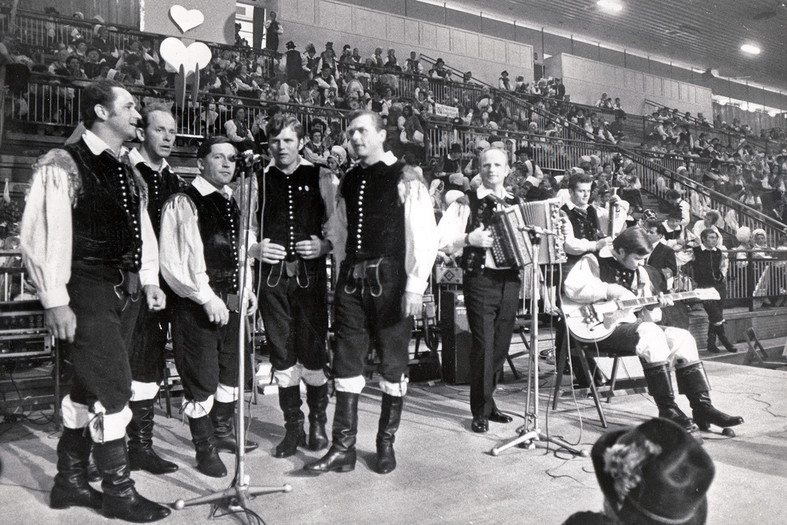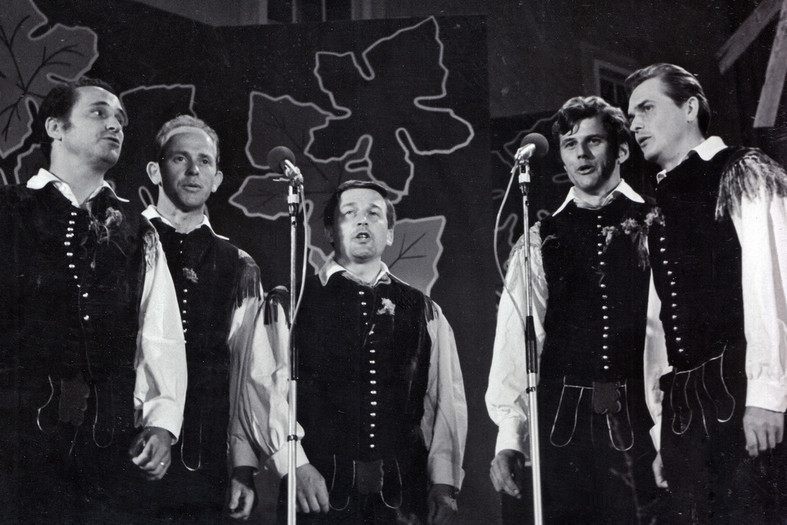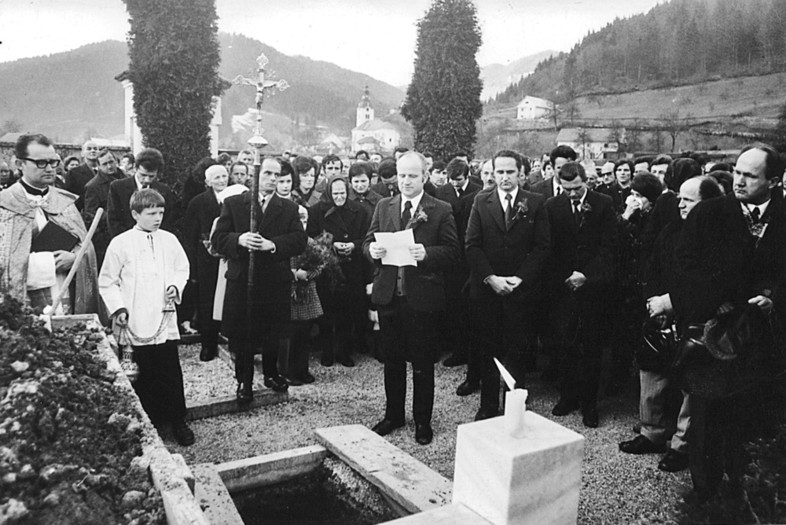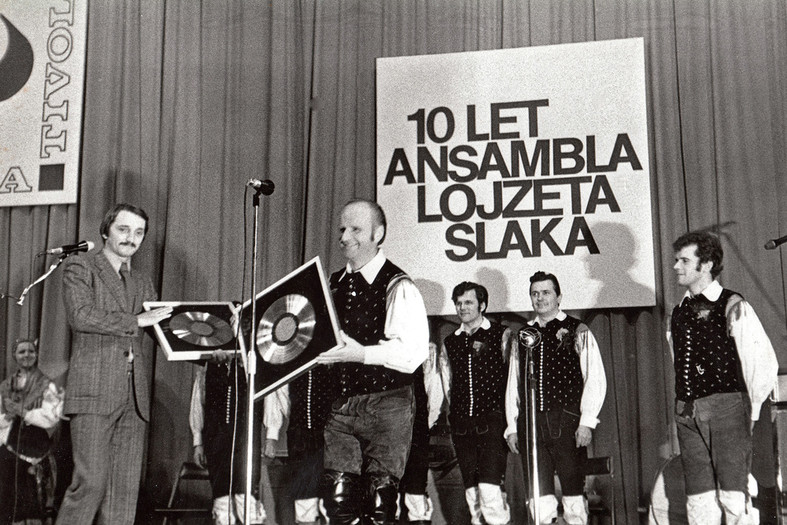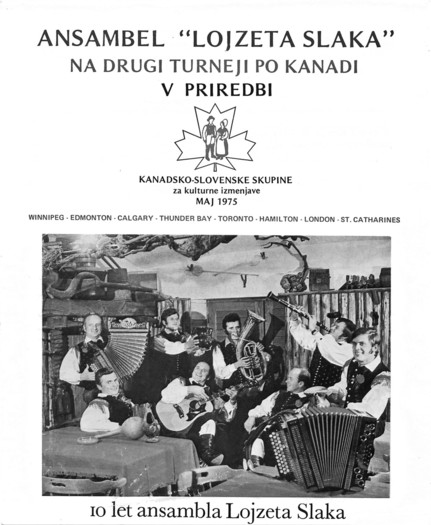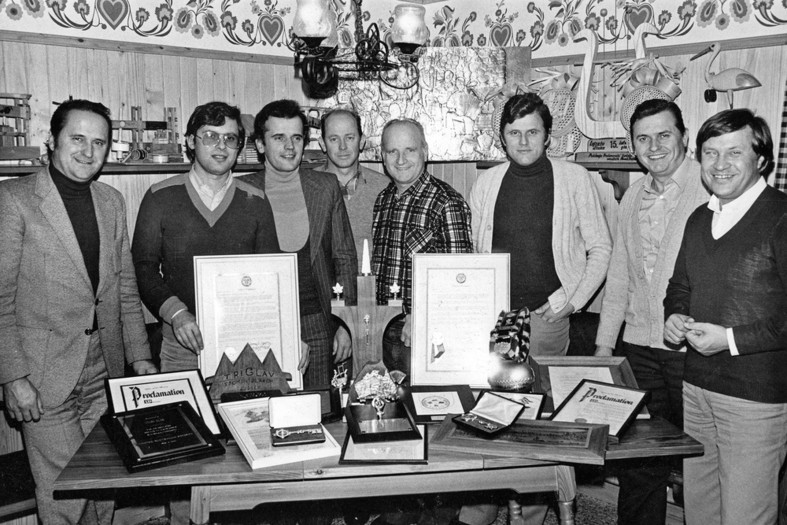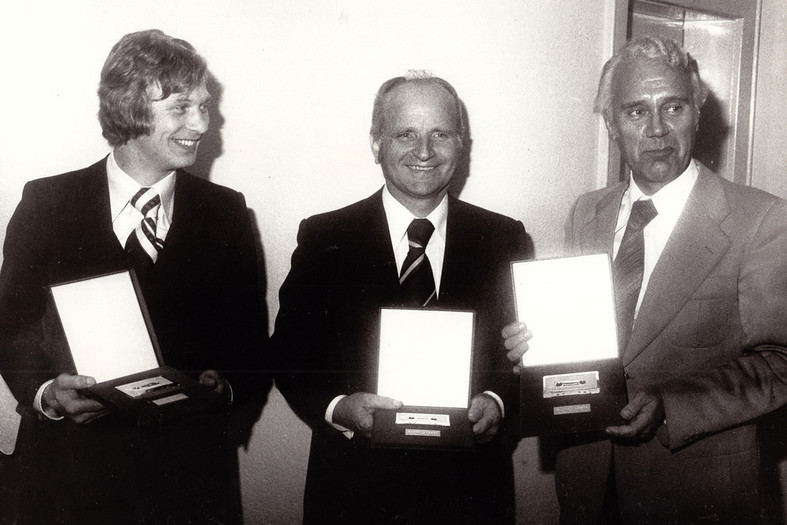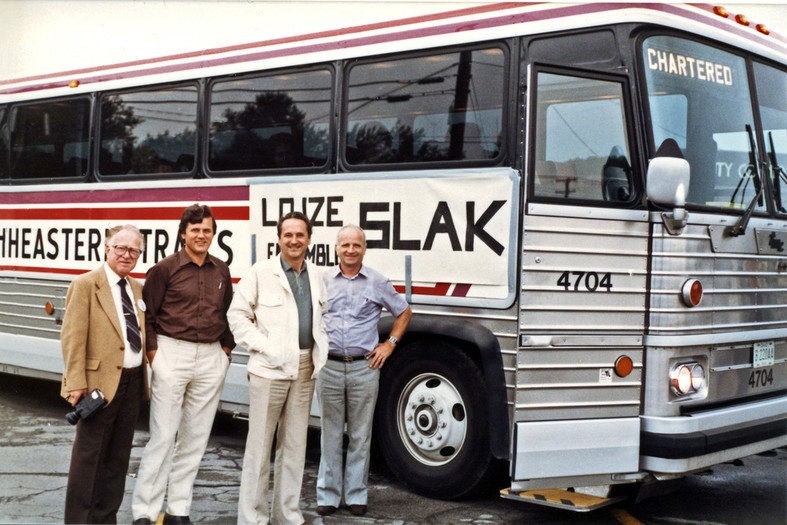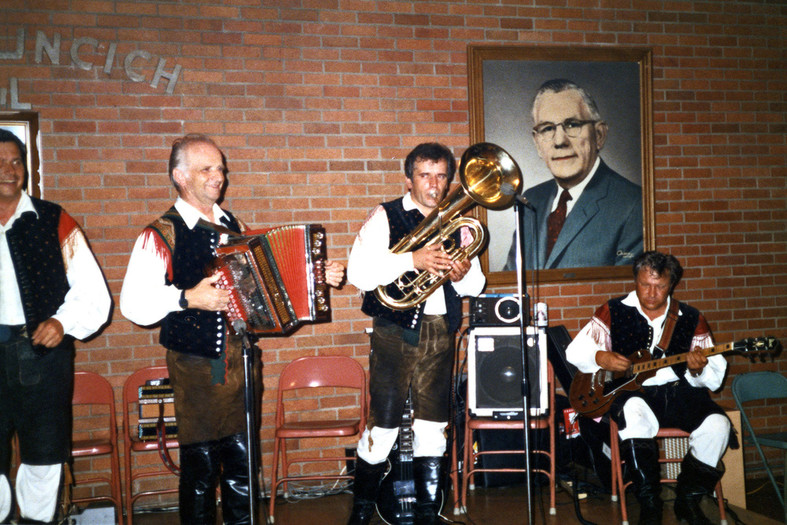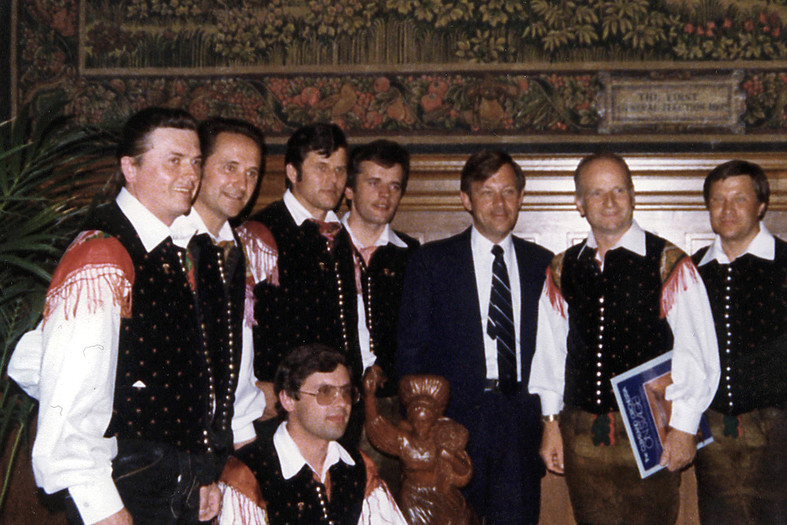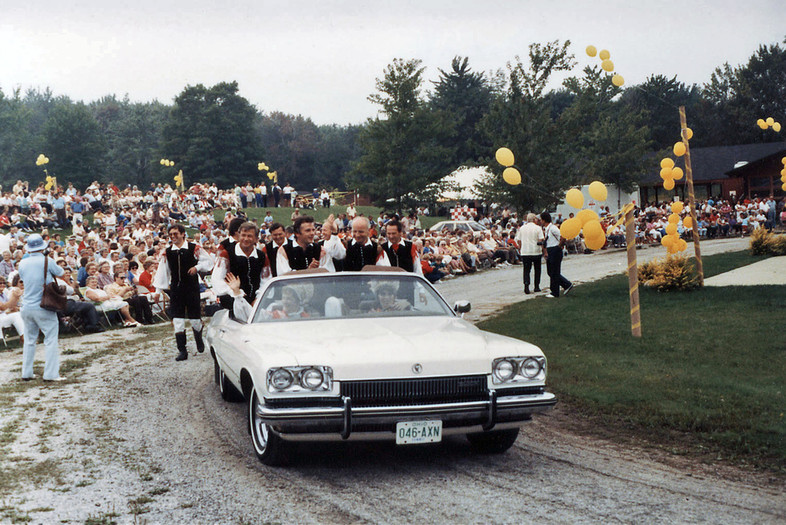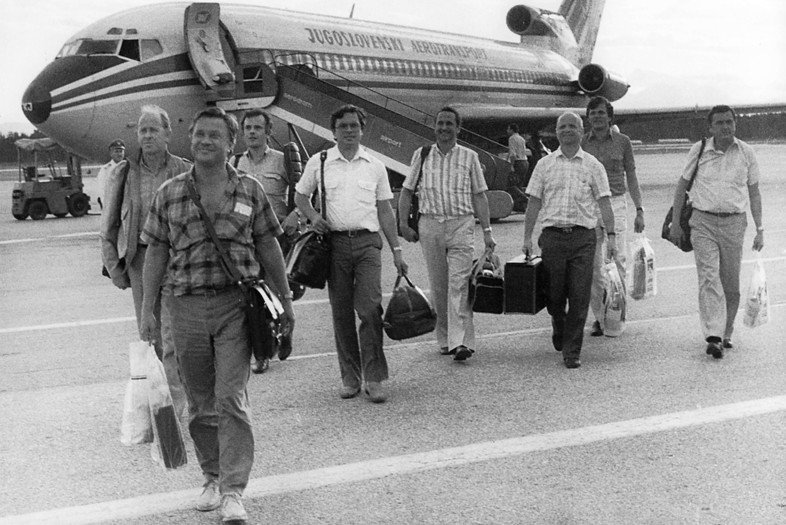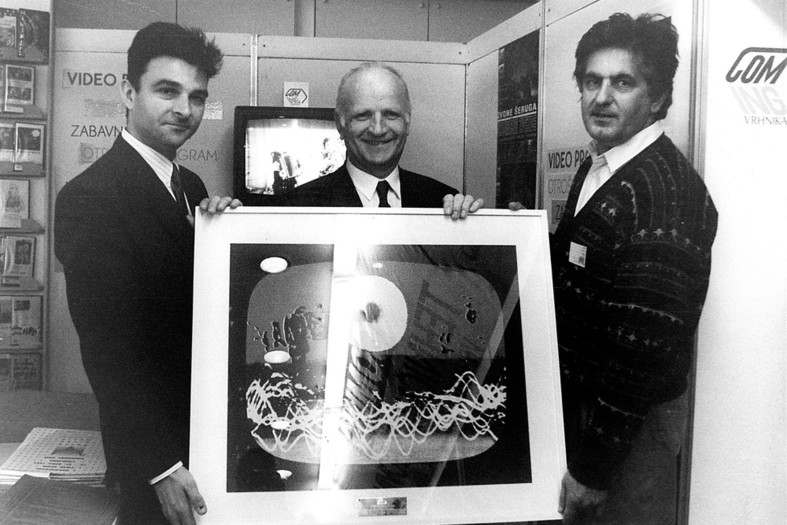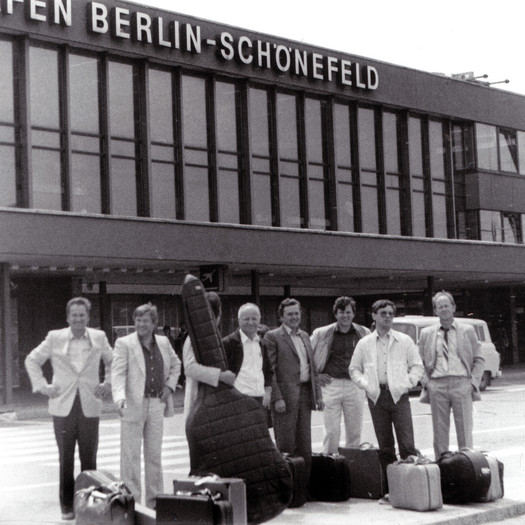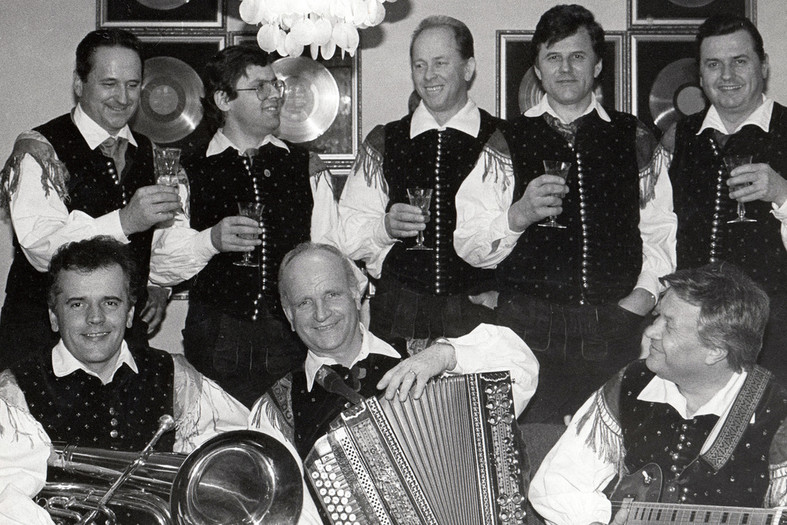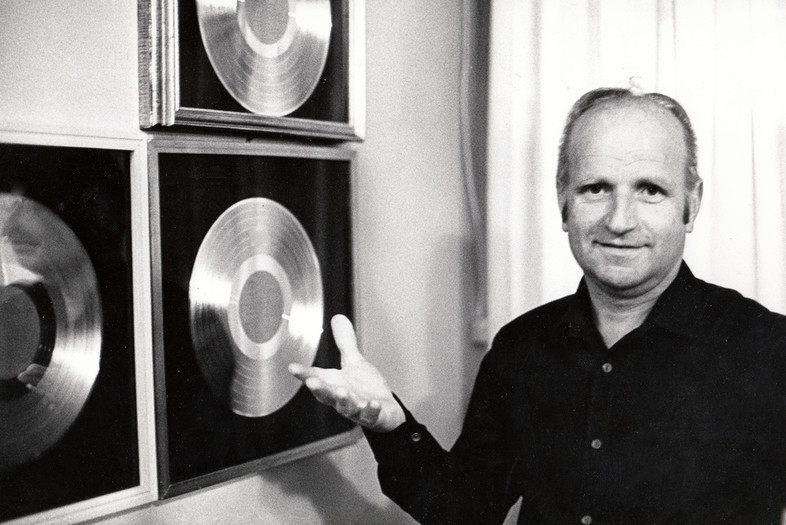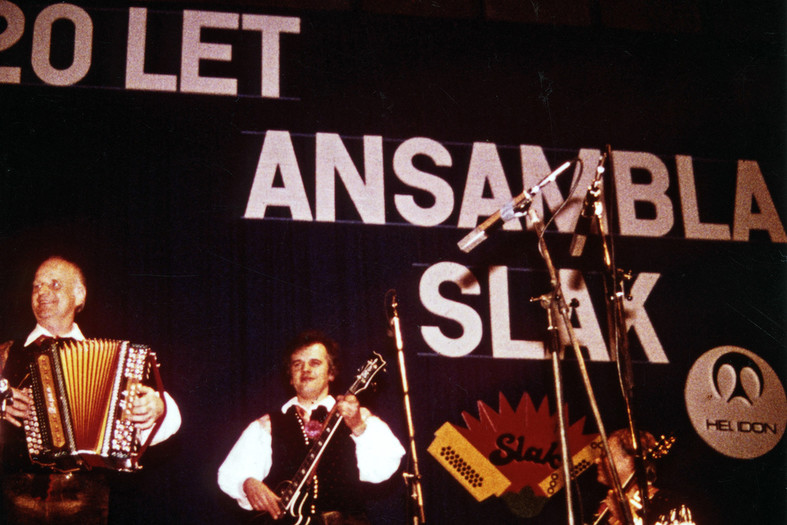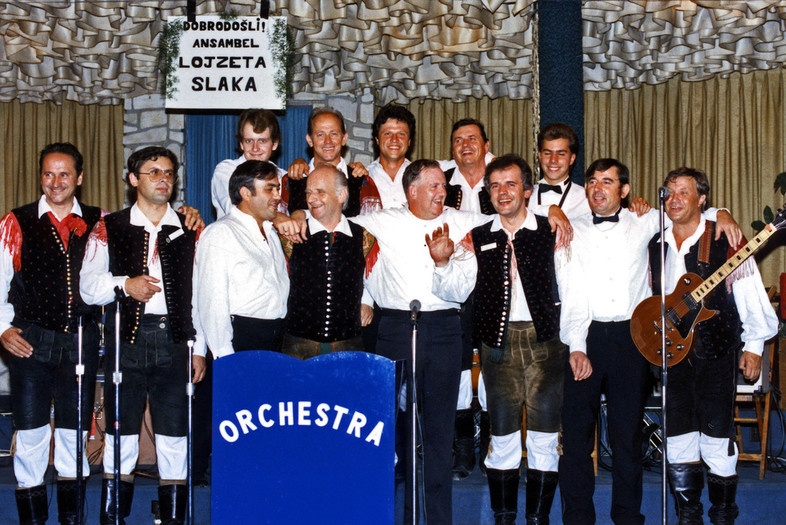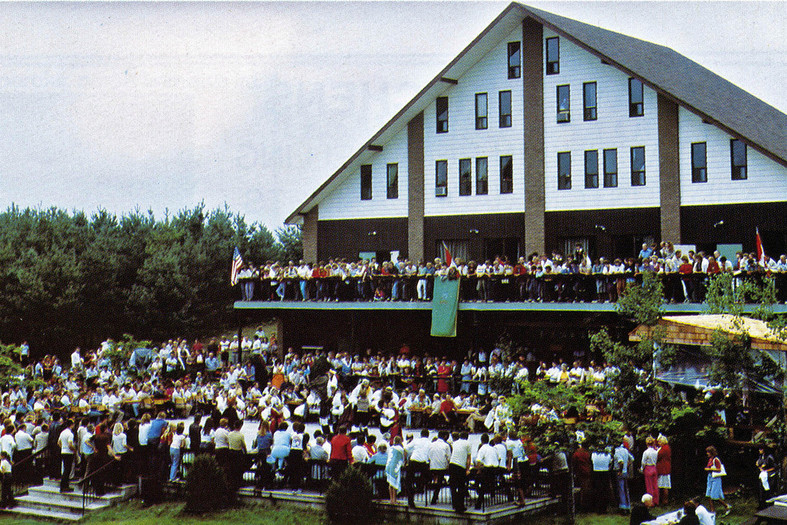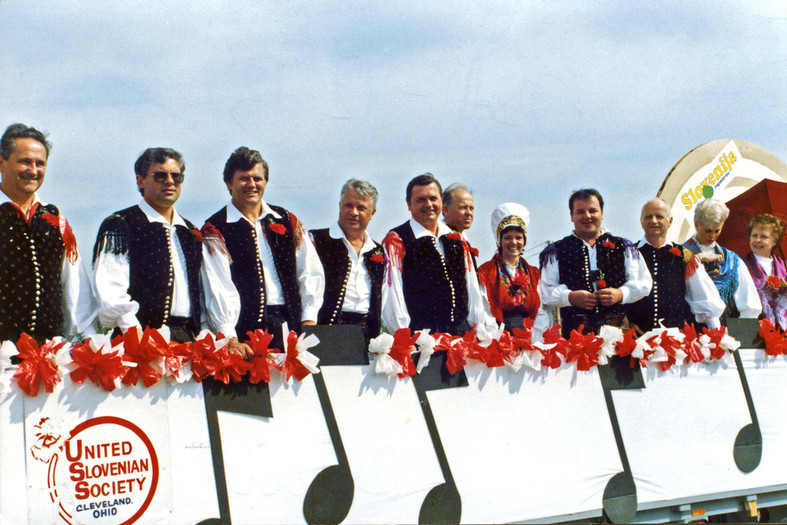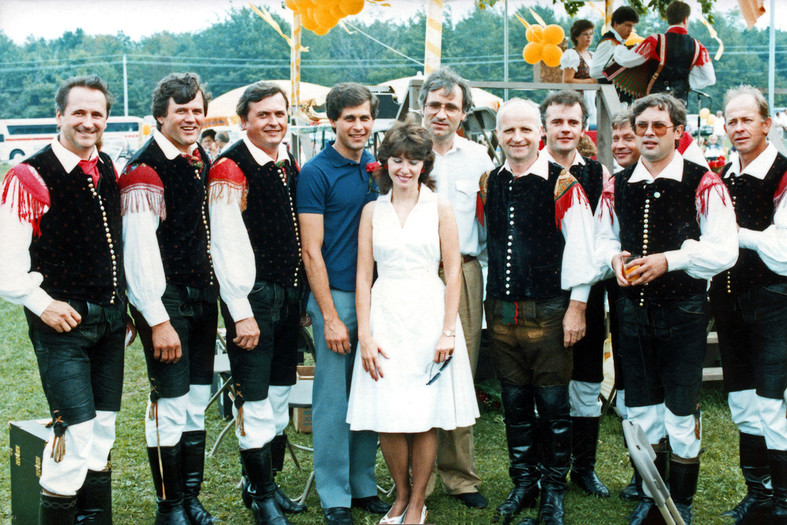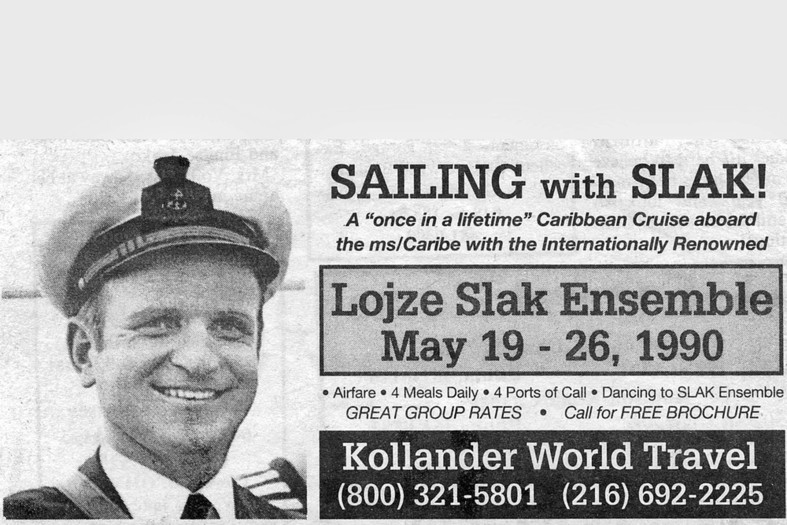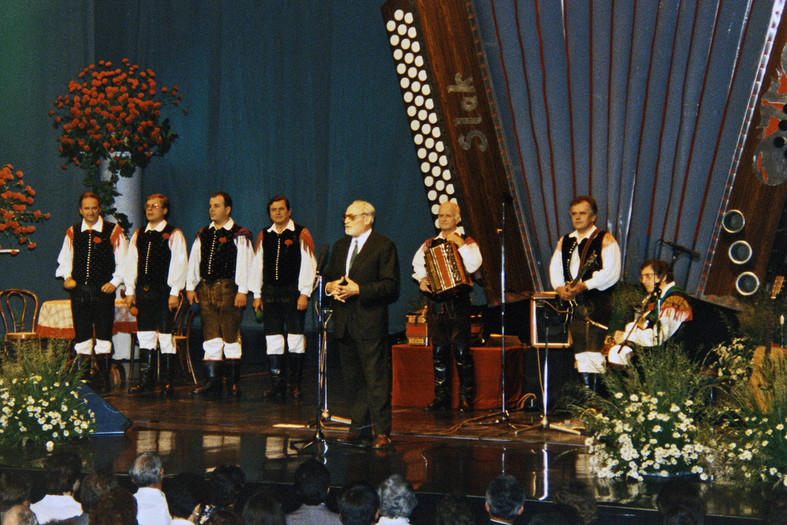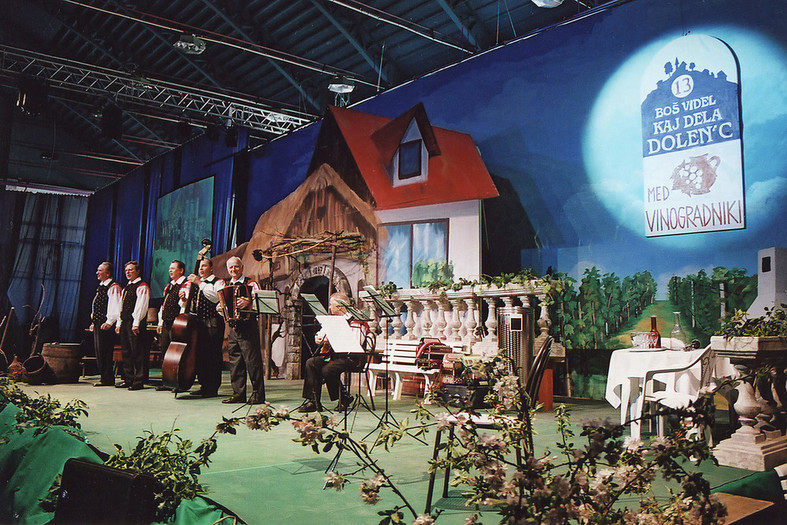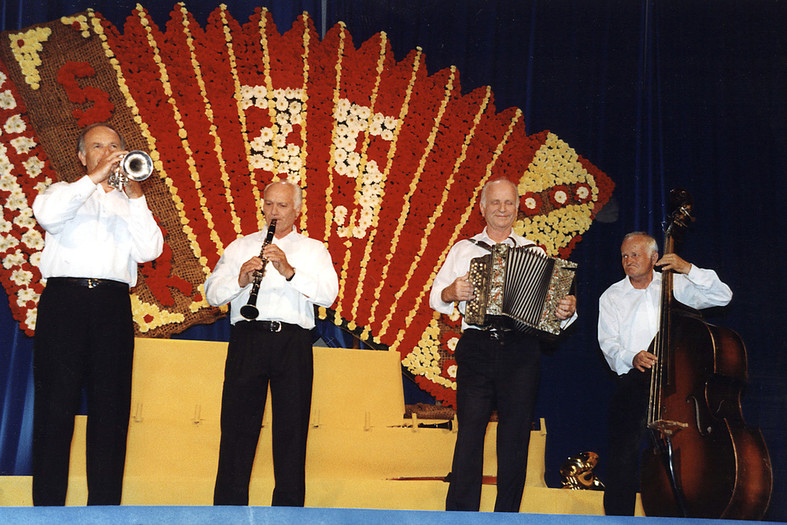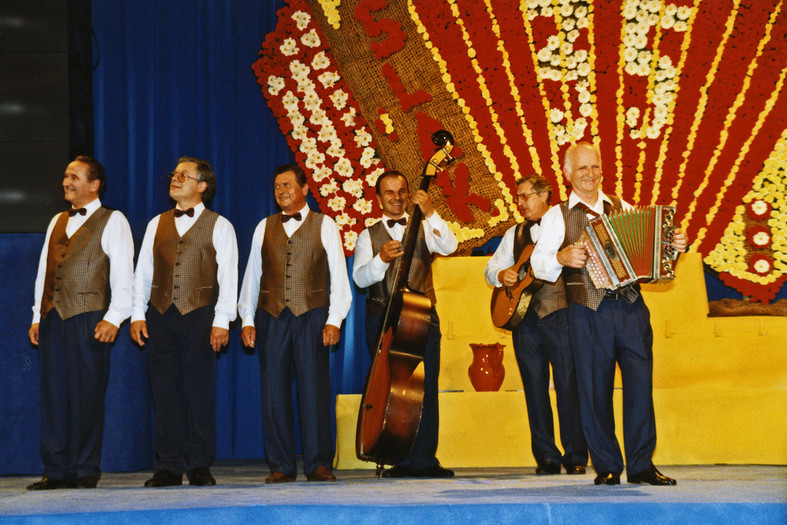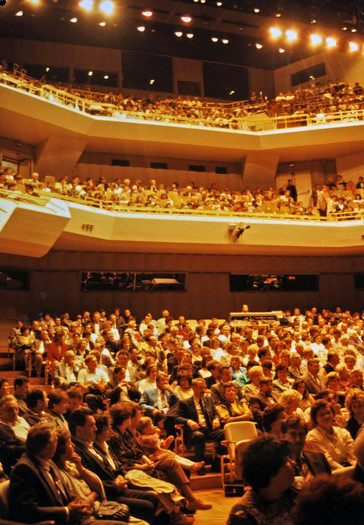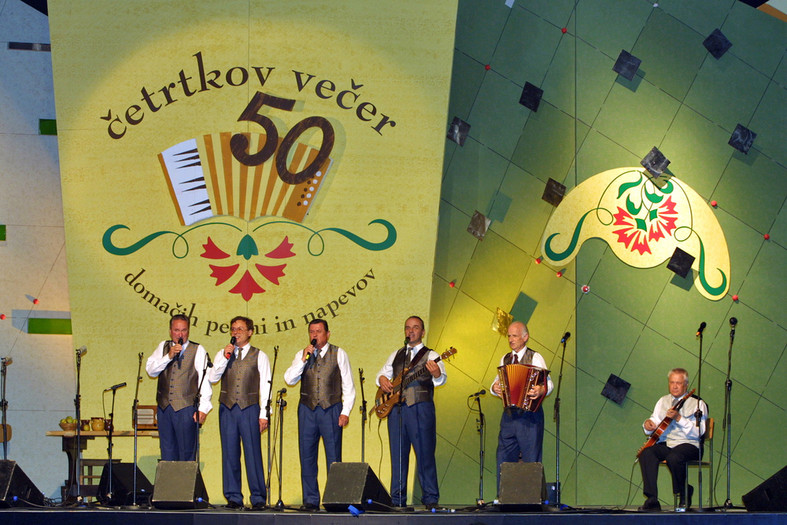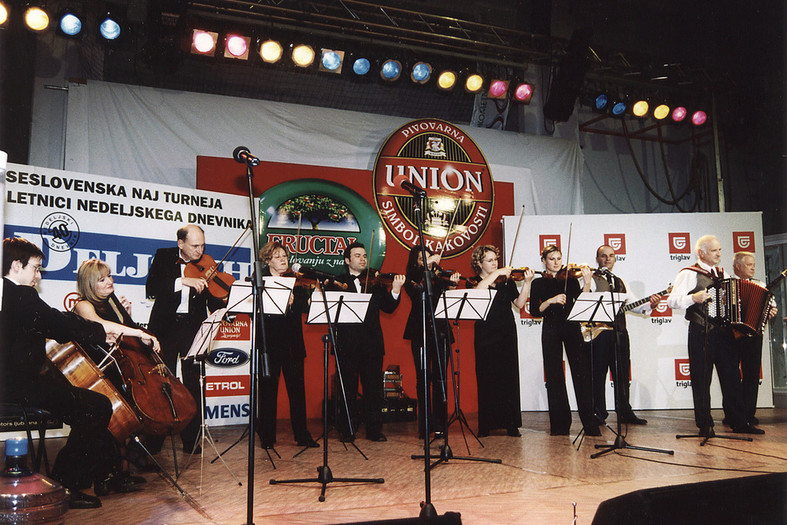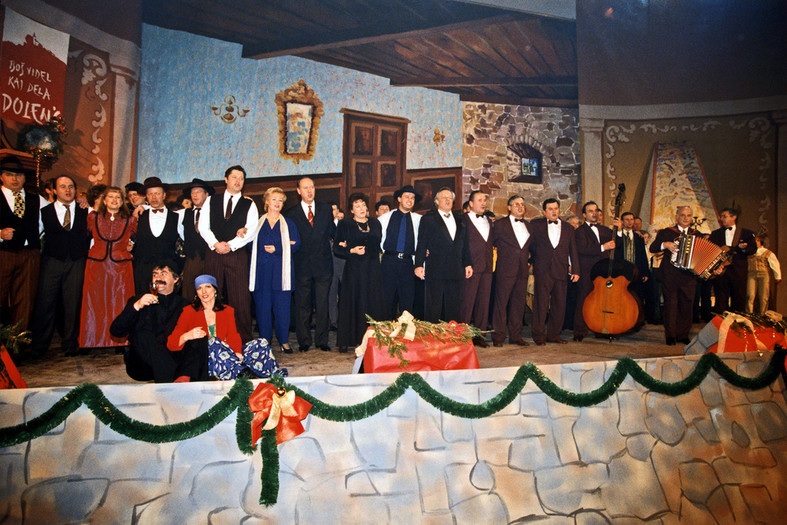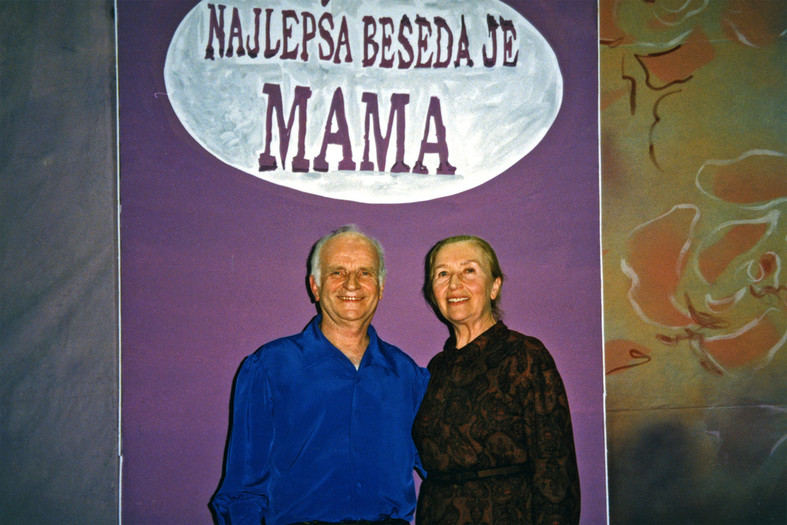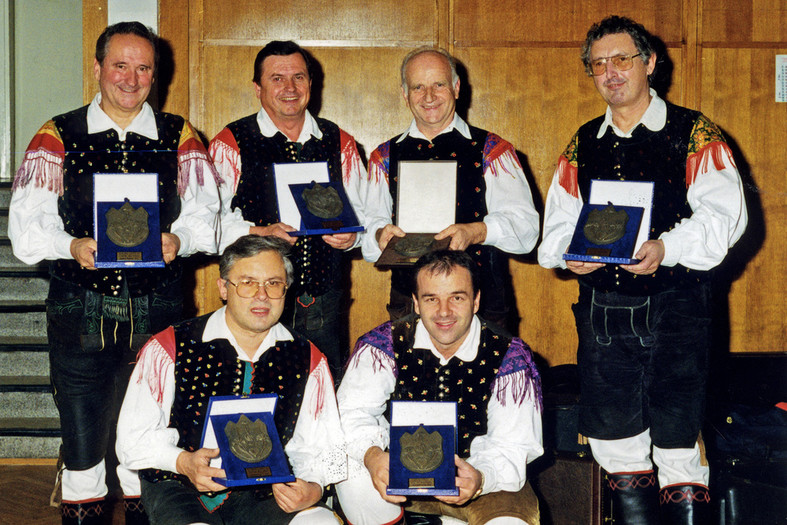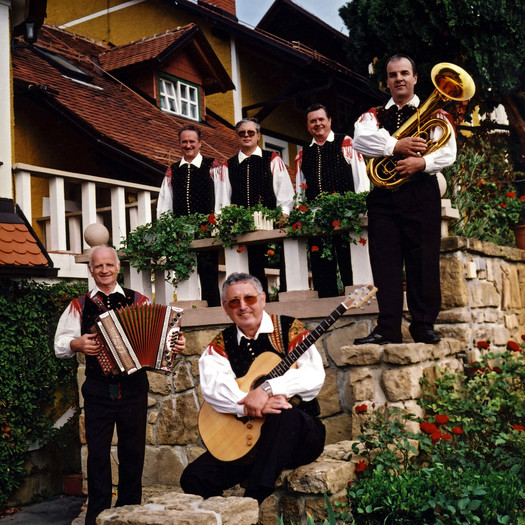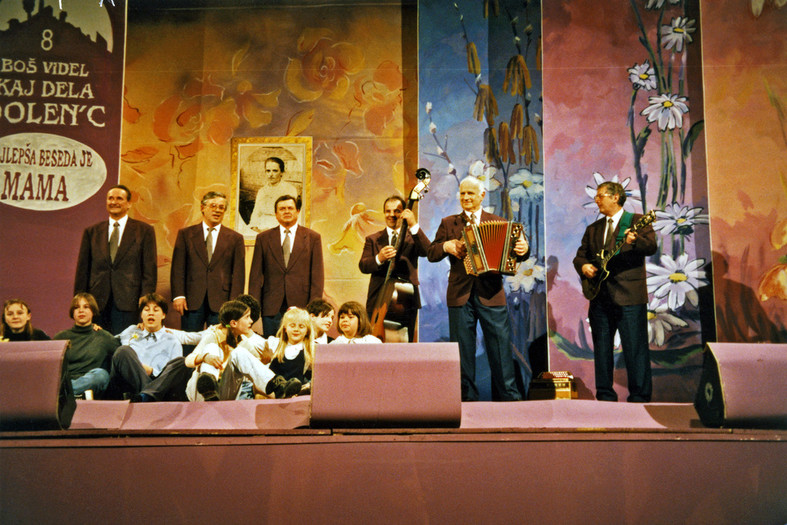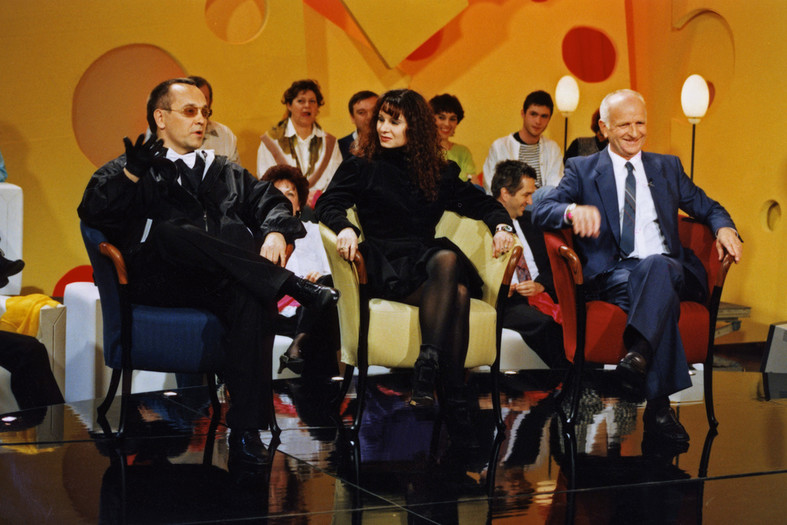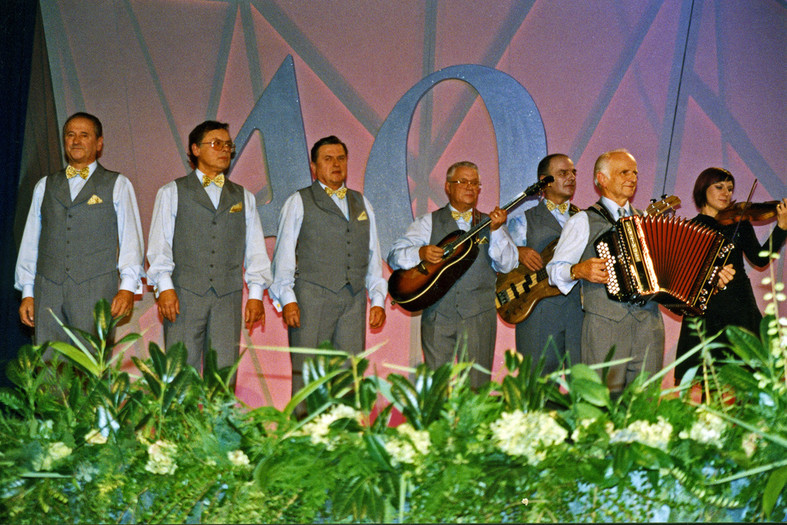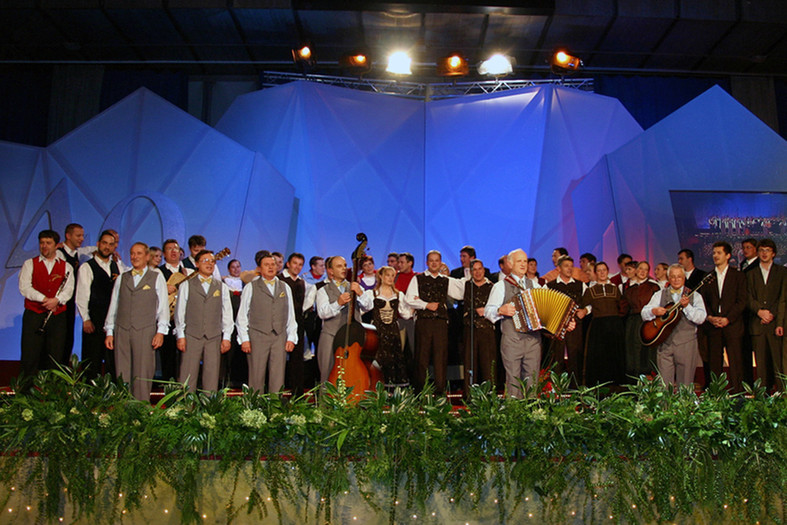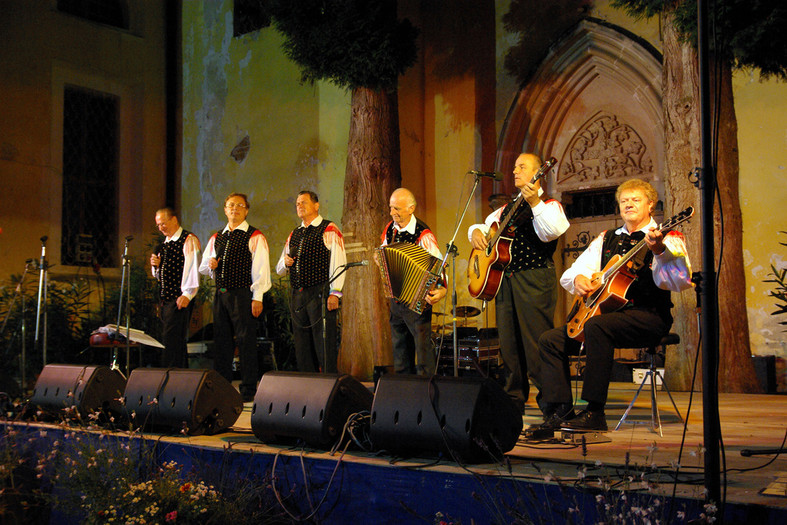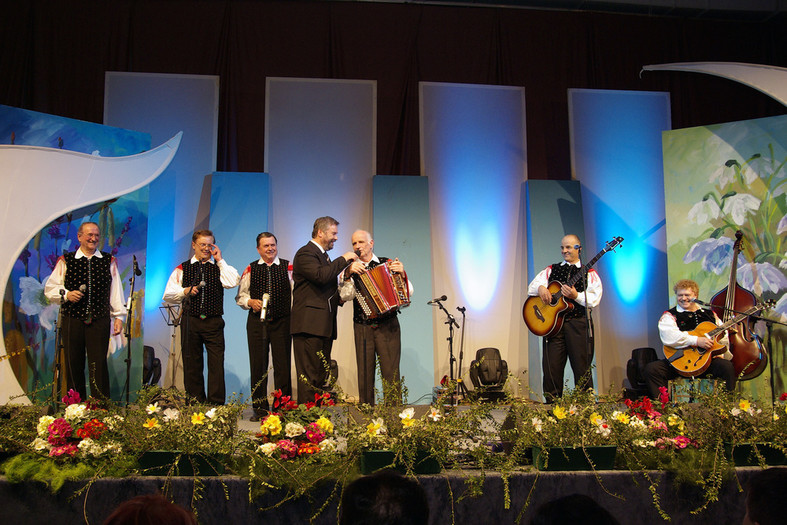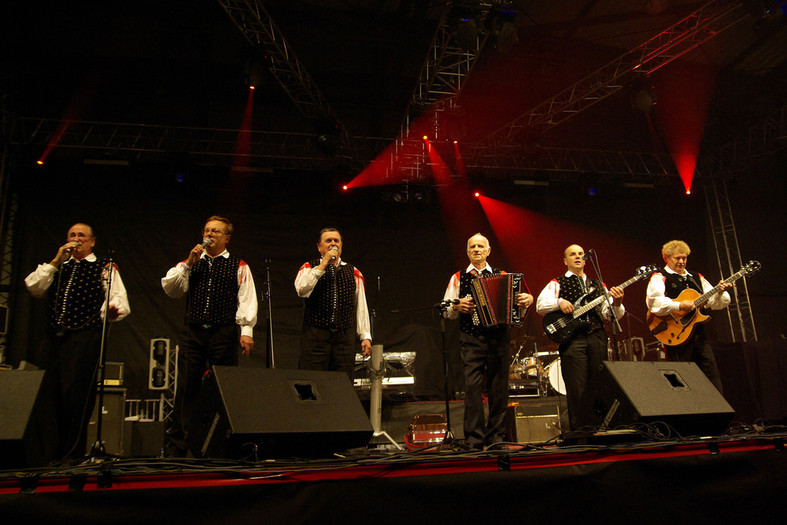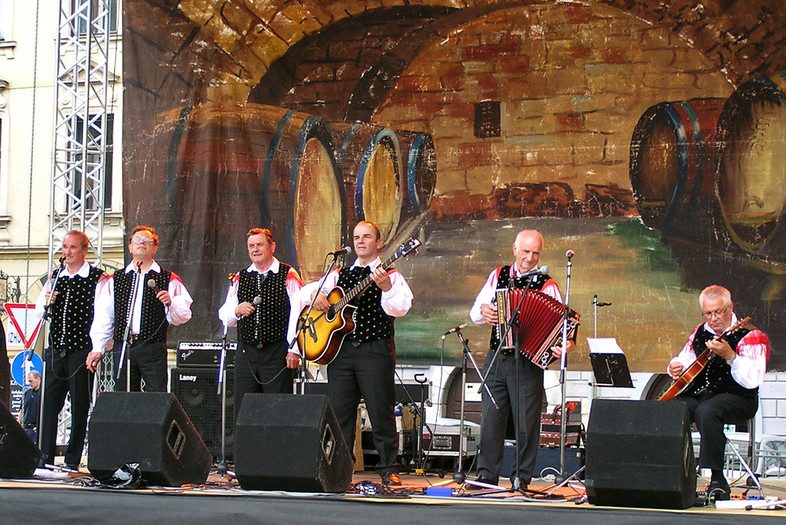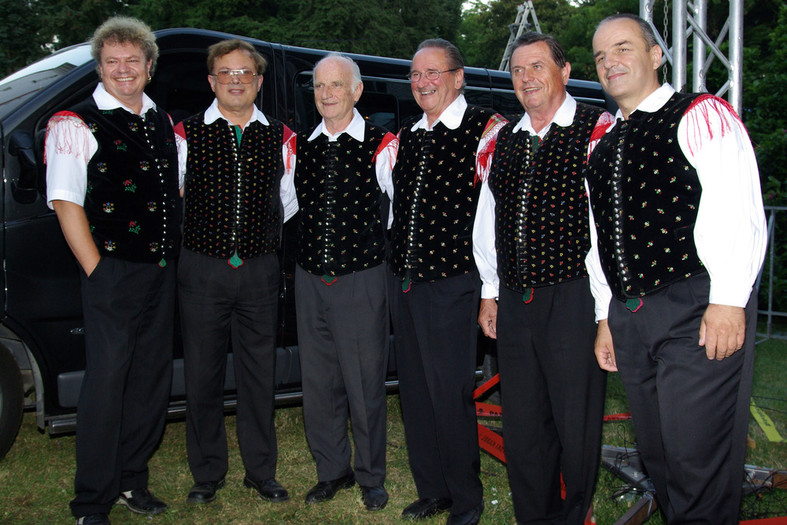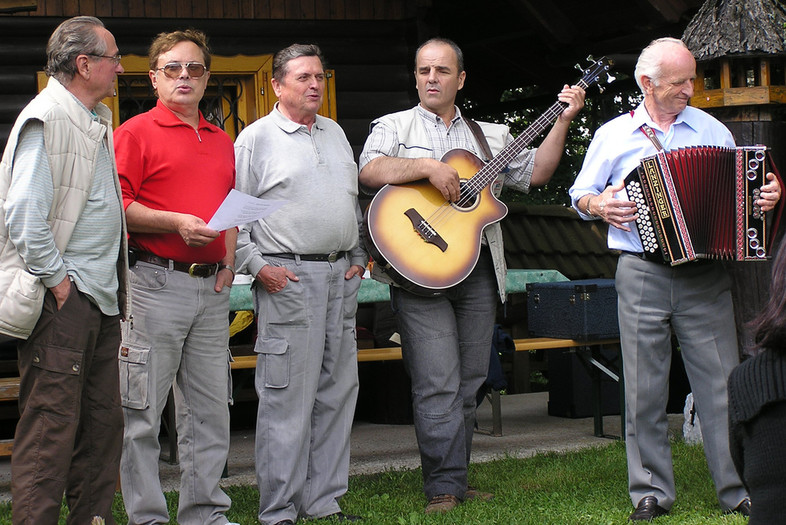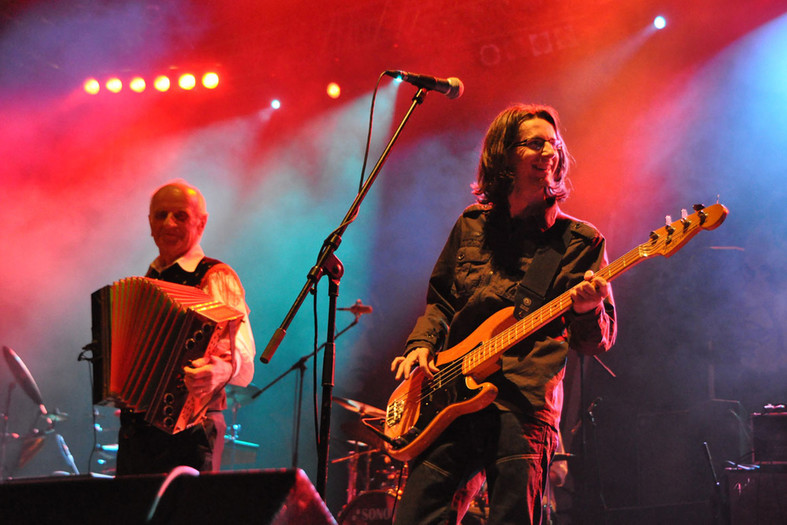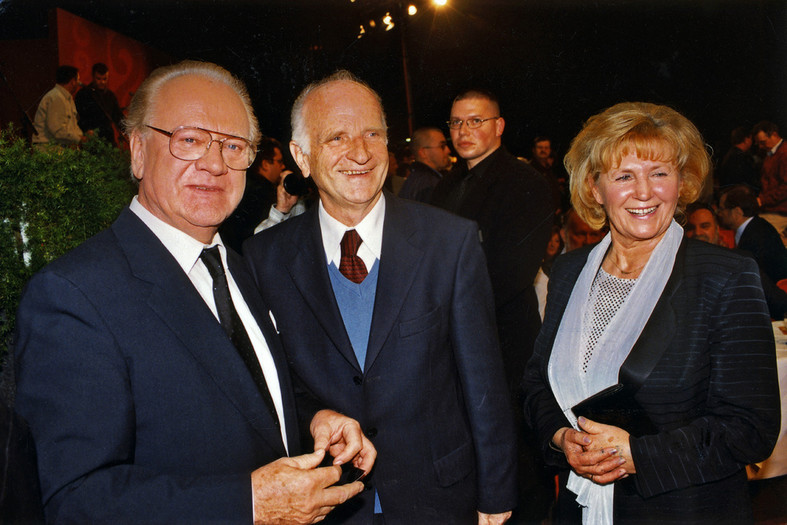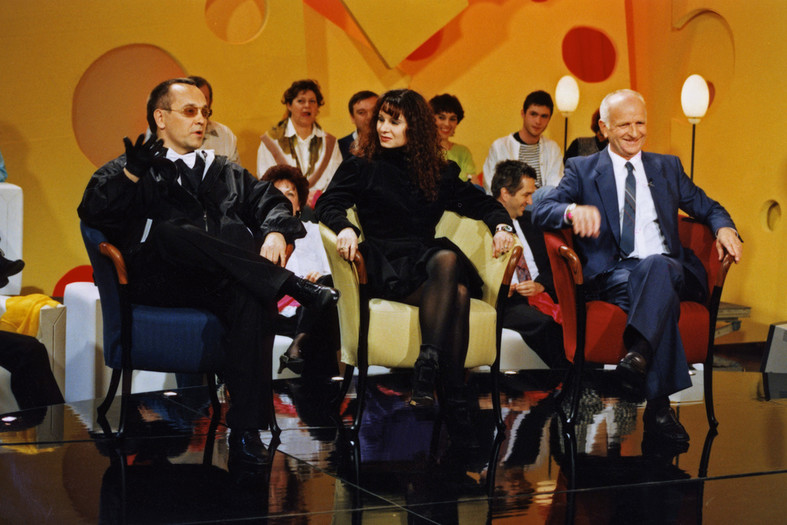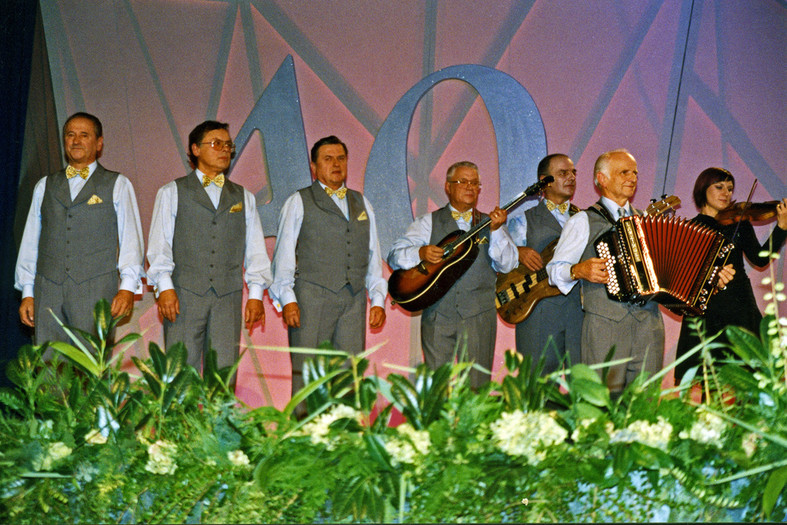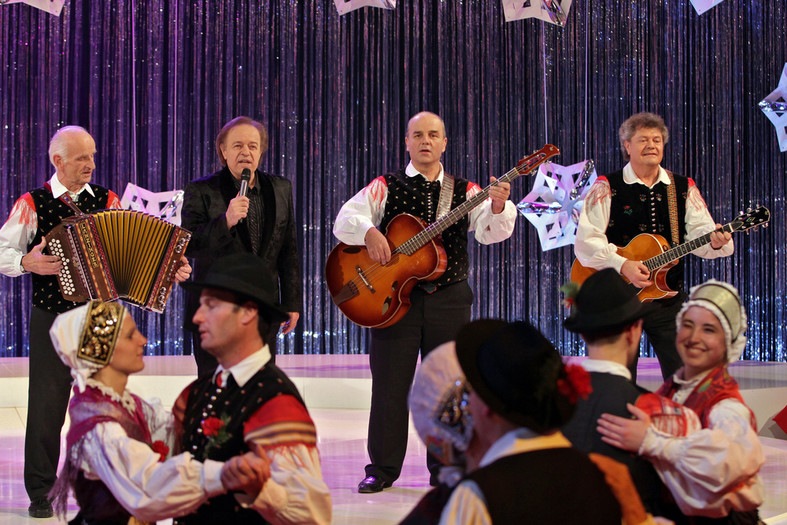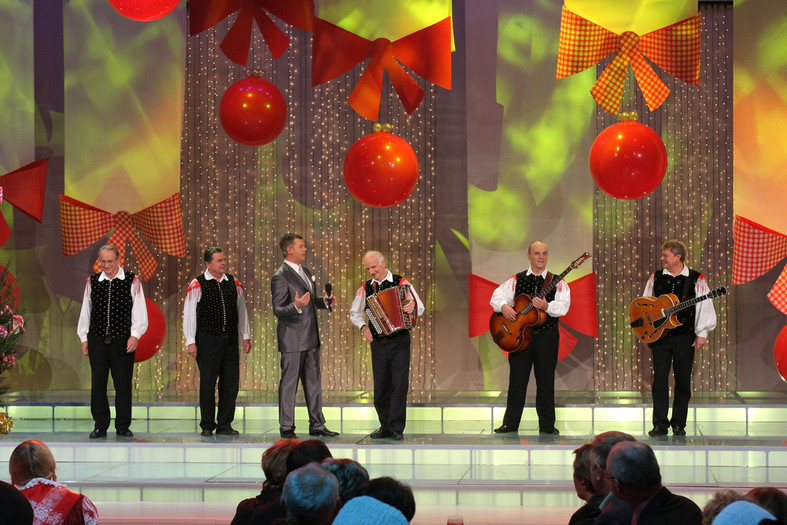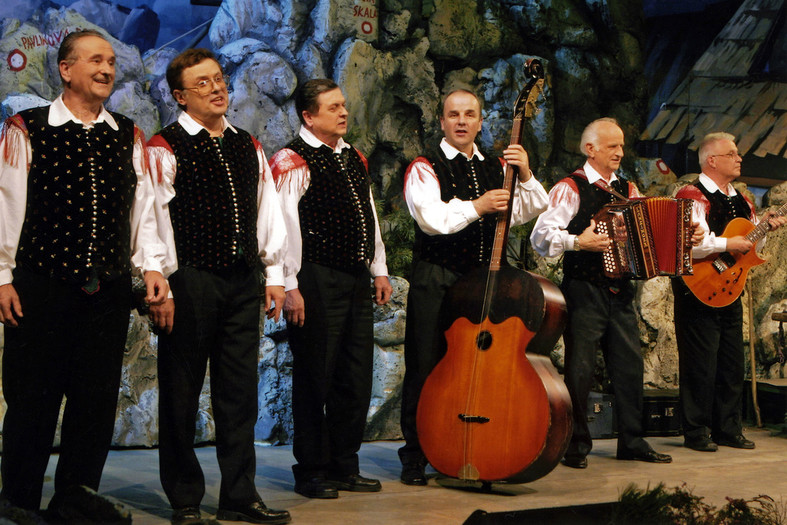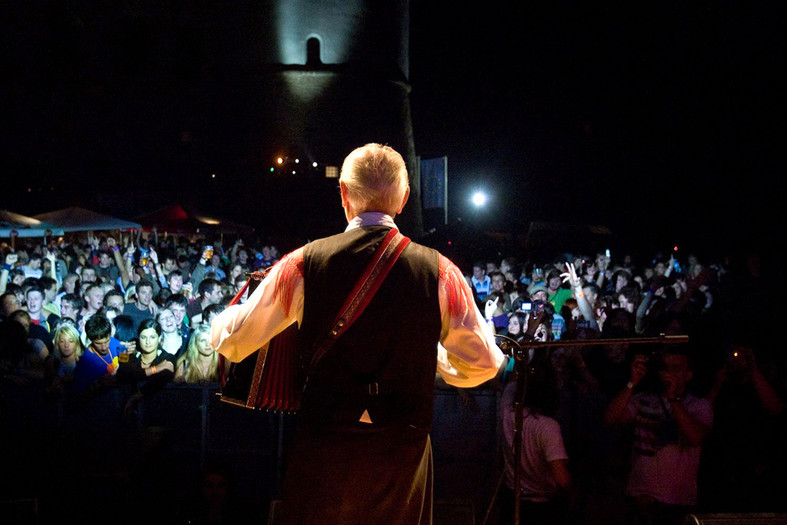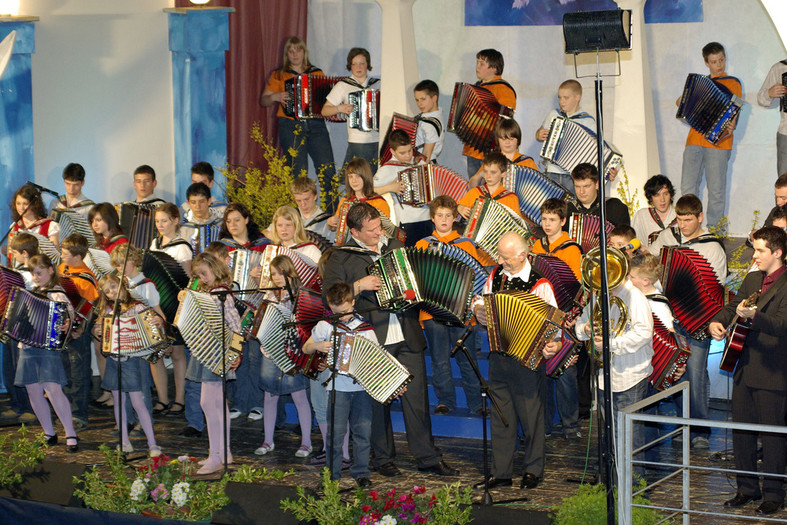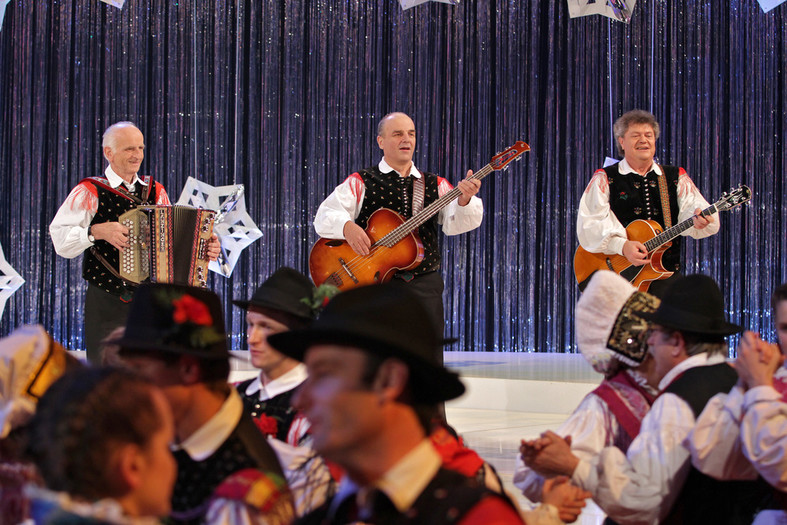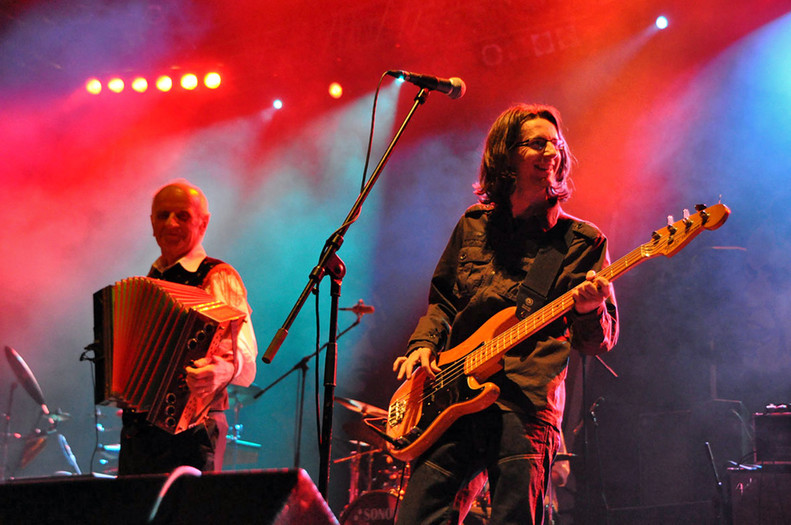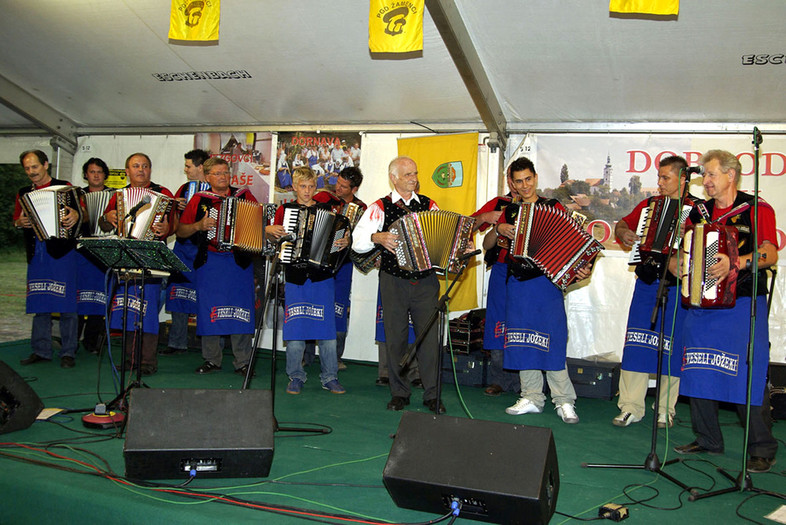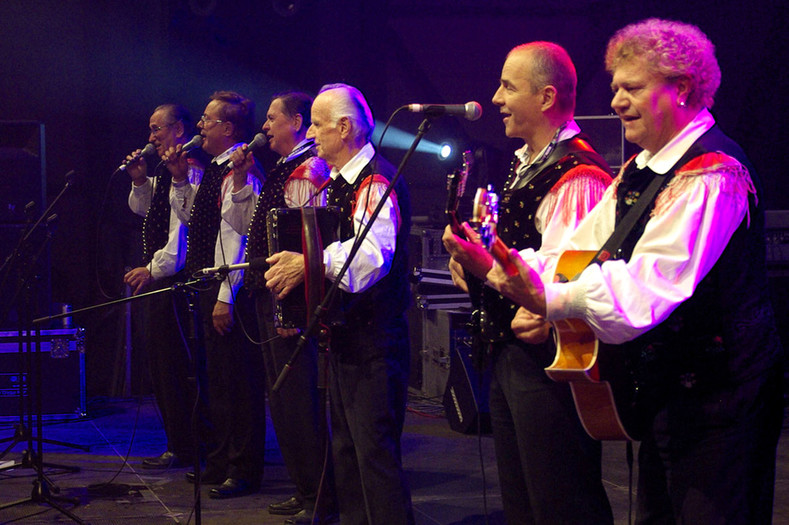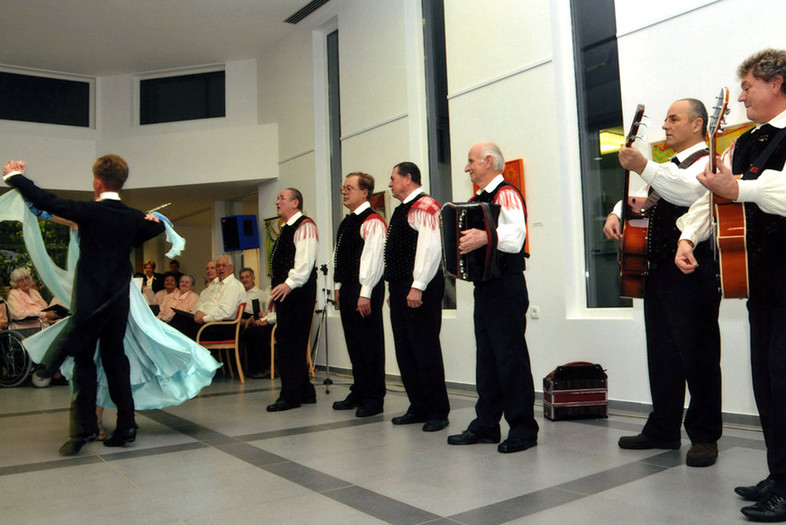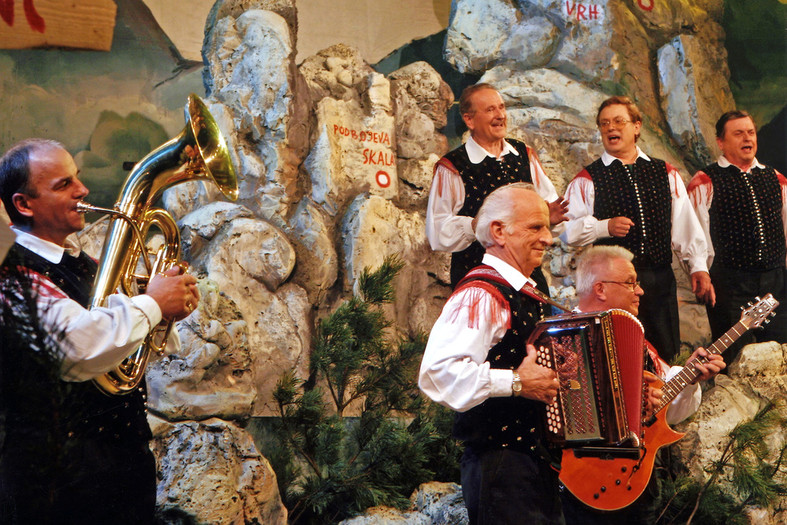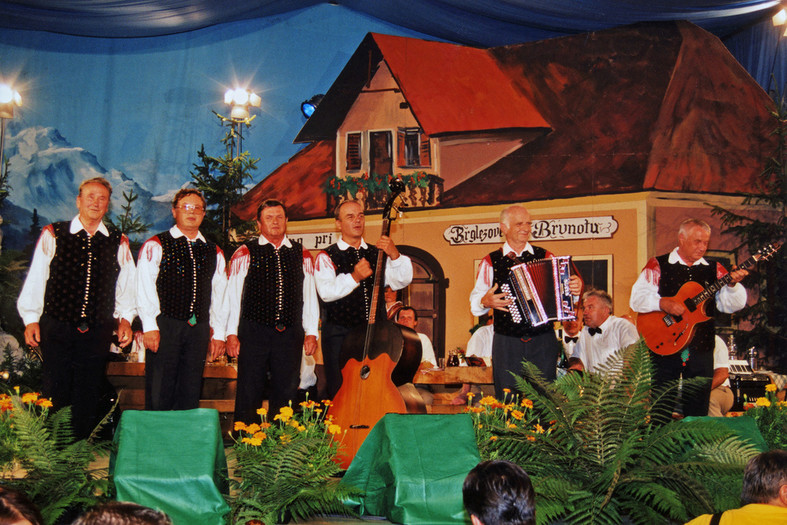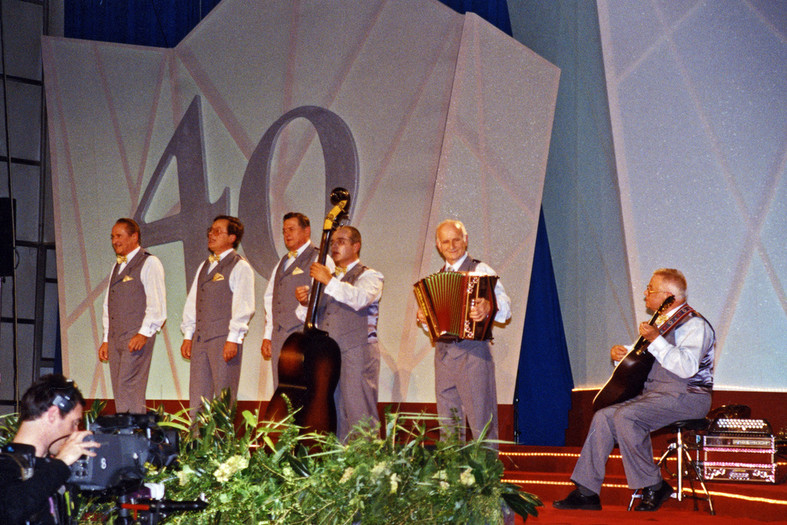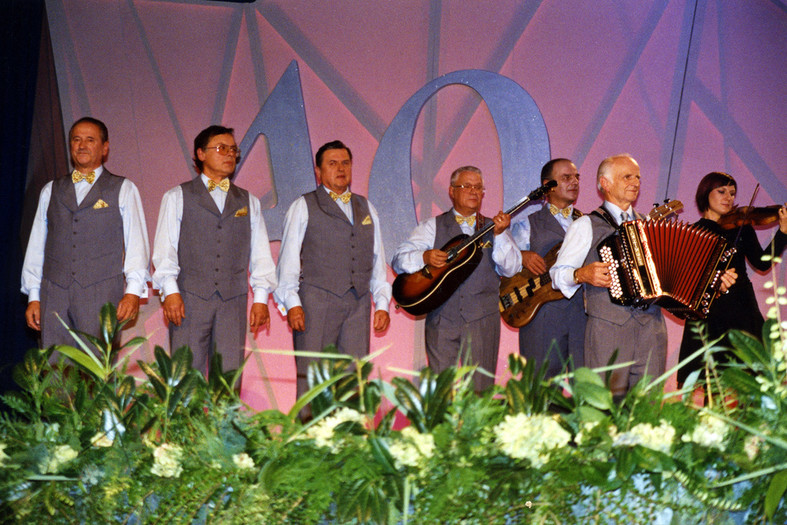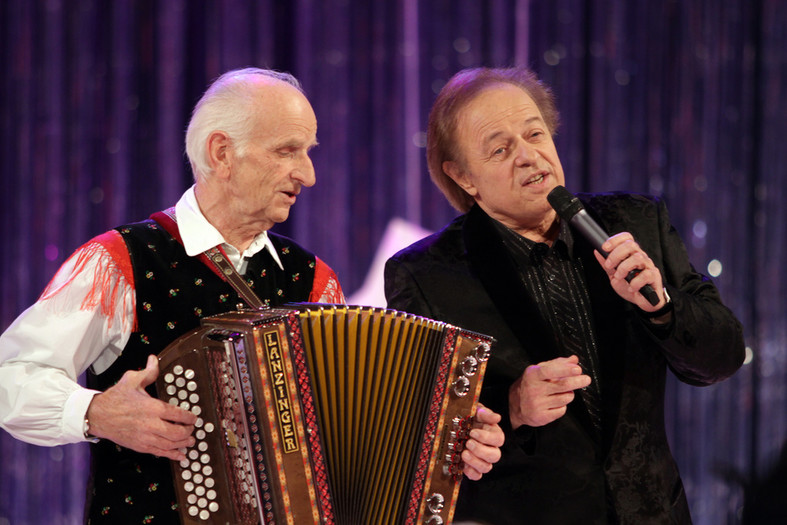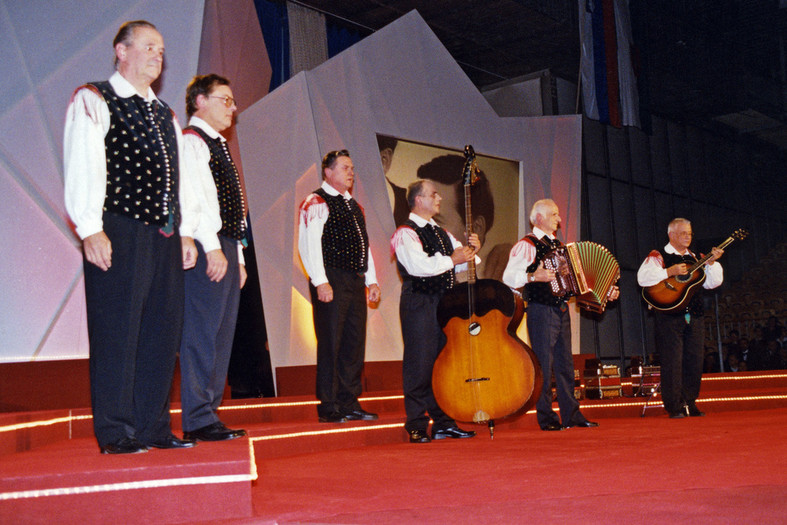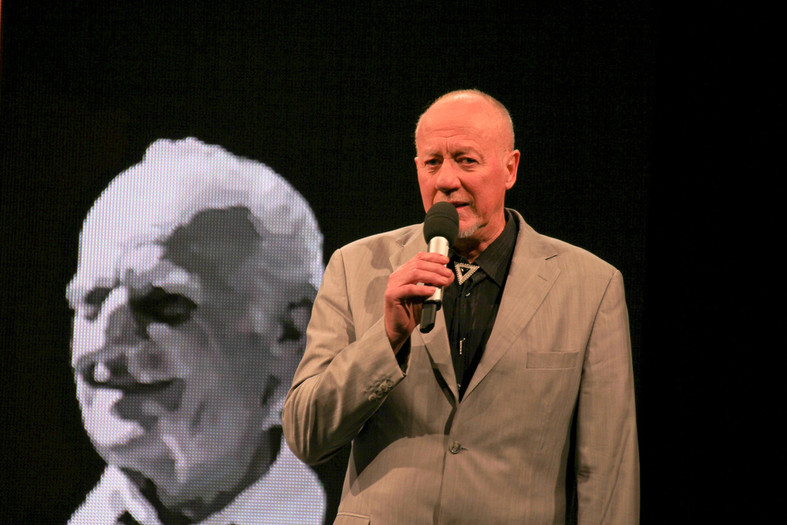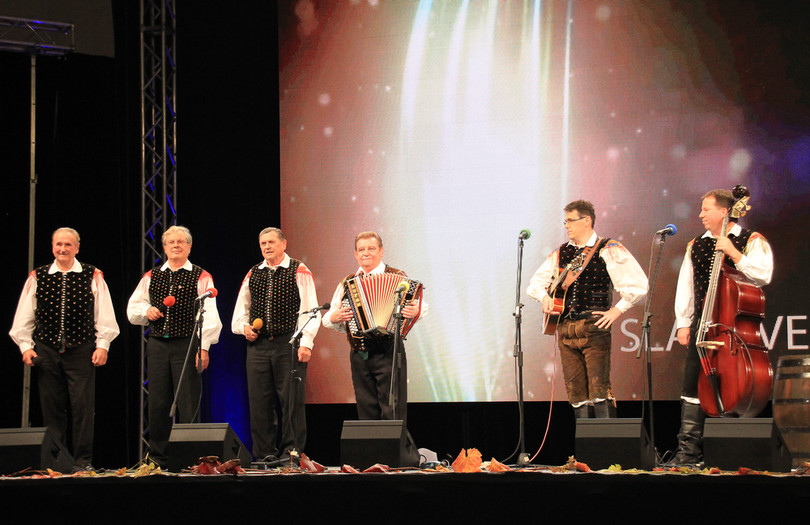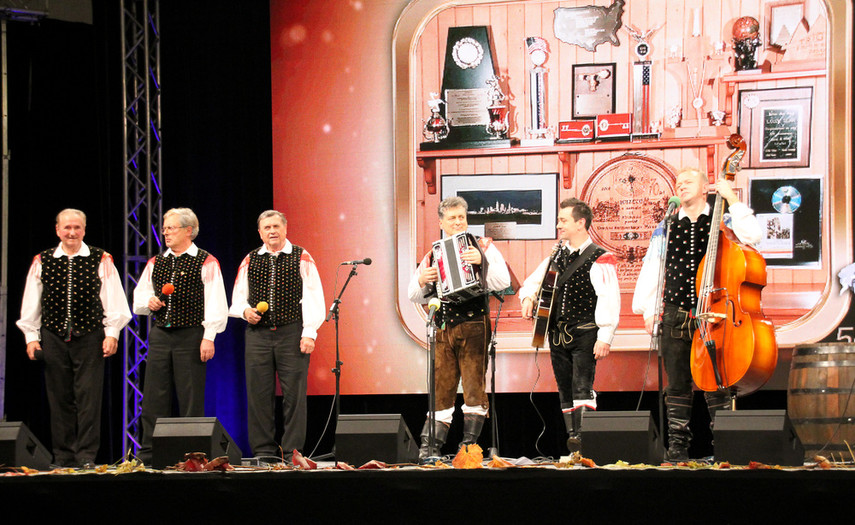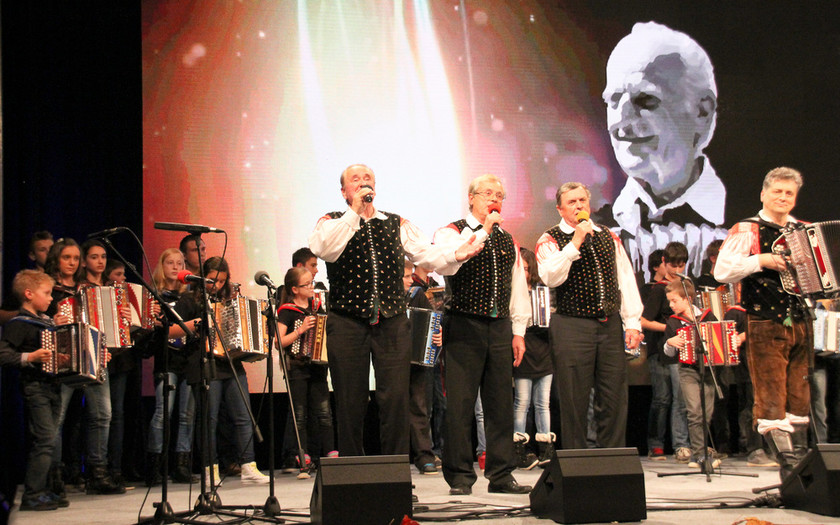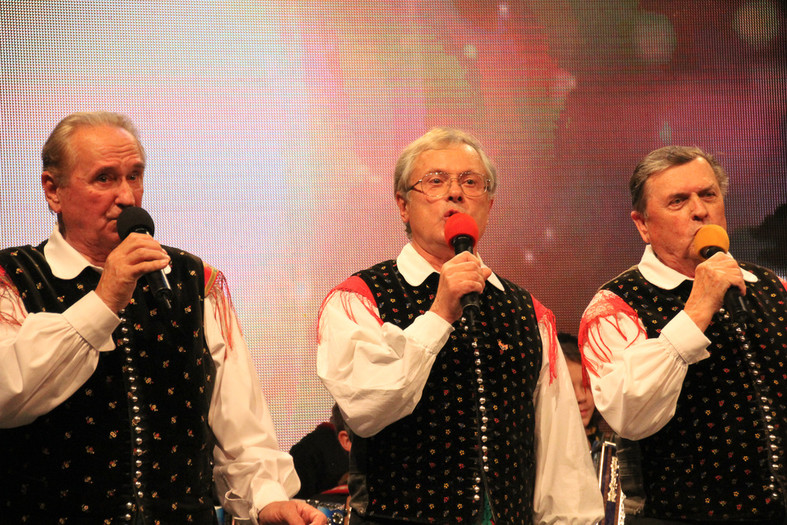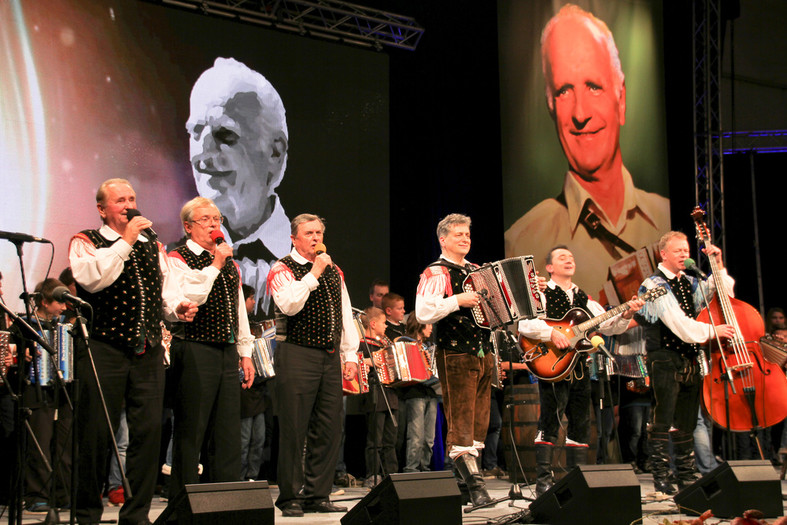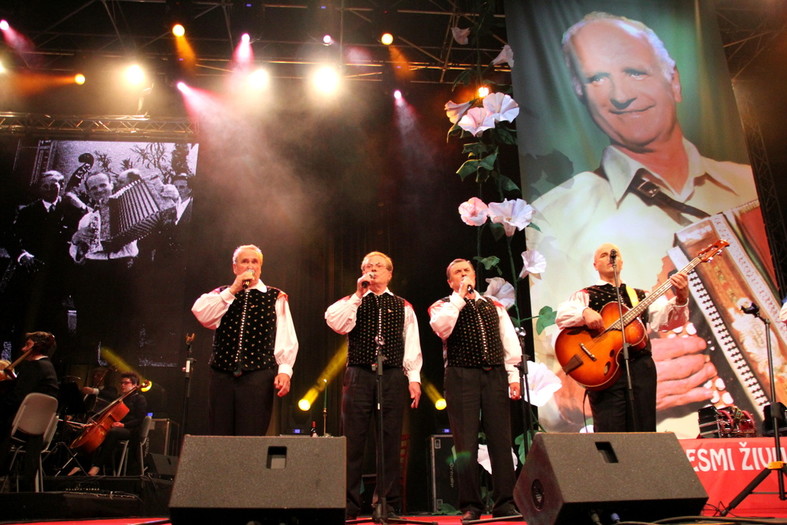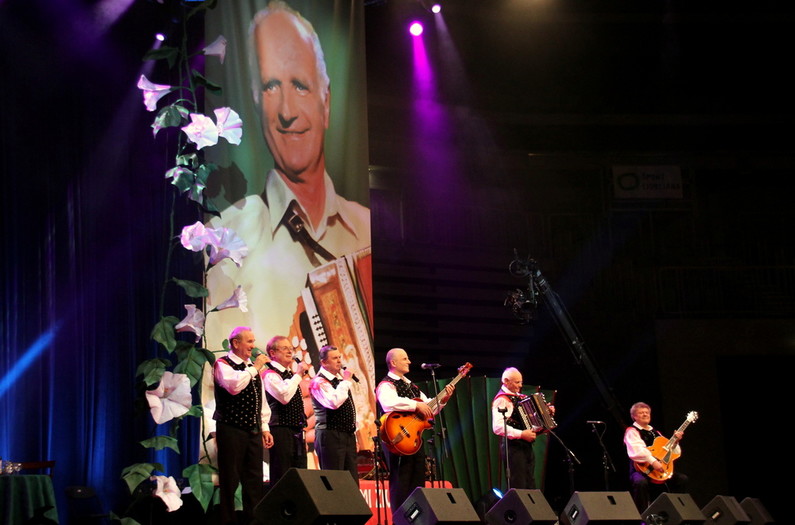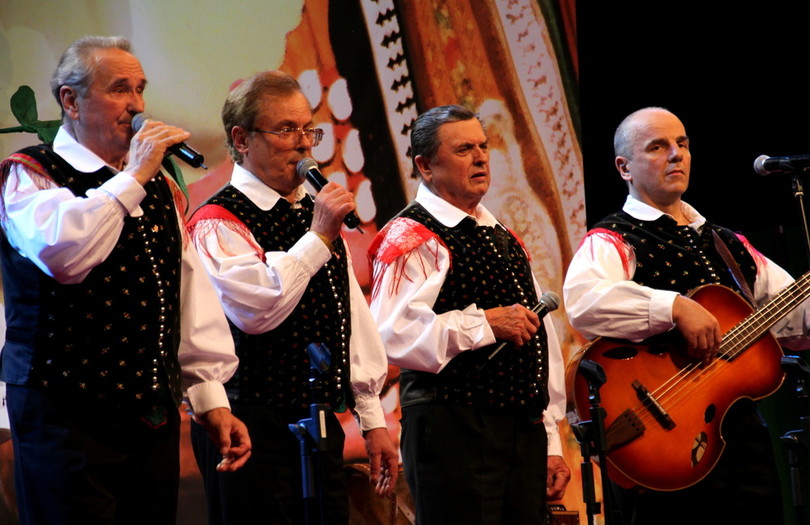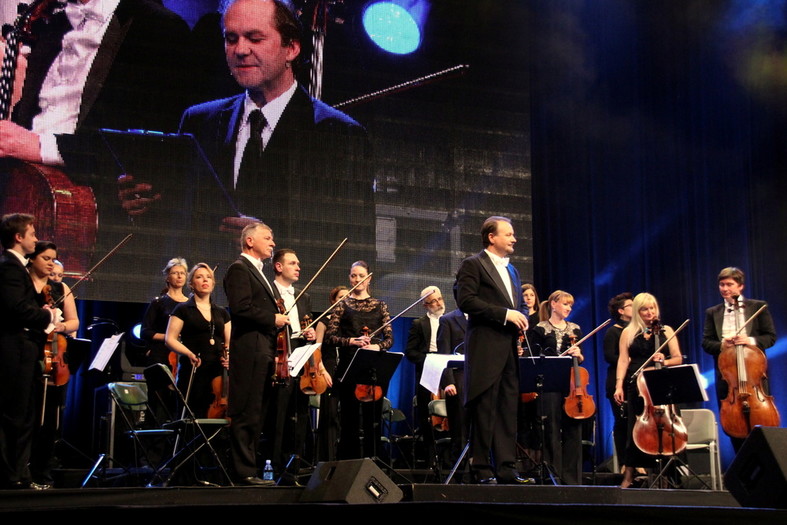Chronology
BEFORE 1964
The year 1964 is usually recorded as the birthday of the ensemble of Lojze Slak, however the story of the ensemble began earlier, when a young man from Jordankal in Dolenjska with his accordion brought the whole hall to its feet. It was on on the public radio show Pokaži kaj znaš! (Show what you know!) where he won first place, and thus opened himself the door to a radio house and recording studios.
In Slak's family, a few other boys were in love with the local melodies, so Lojze soon formed an instrumental quartet together with his brothers Matija, Stane and Tone, whom the whole of Dolenjska met in a short time.
The happy boys, with their music that sounded warm and homely, performed at many events, weddings, and the festivities.
However, when the army call arrived, the boys dispersed, Lojze moved to Ljubljana seaching for work and the Slak Brothers Ensemble stopped playing.
But Lojze did not give up. He and his friend Niko Zlobko, who joined to the Slak brothers with clarinet and guitar when the first brother had to go to the army, have also convinced Ciril Babnik with an ancient Slovenian string instrument - berda to join them. This is how Lojze Slak's instrumental trio was conceived. When Ciril Babnik said goodbye to the ensemble after less than two years of playing, he was replaced by Franc Sever in the trio.
They successfully performed at village hops in many places in Slovenia and at one of such meeting of ensembles at the Gorenjska Fair in Kranj won the competition. They also won the first prize in the meeting of ensembles at the Ljubljana Exhibition and Convention Center, and the path to recording studios was getting closer every day.
The ensemble of the Slak brothers recorded the first compositions for the radio archive in the early 1960s, and the Lojze Slak Trio had already recorded the first single record in the production of RTB at the beginning of 1964. Hovewer the real start of the Lojze Slak Ensemble was the meeting of Slak's instrumental trio with the vocal quintet Fantje s Praprotna.
Singers from the Selška Valley - tenors Andrej Bergant and Jože Šifrar, baritone Janez Habjan and bassists Janez Kalan and Janez Dolenc - have been celebrated just like Slak's trio on one of the shows Pokaži kaj znaš!. Shortly after the meeting on this Ljubljana radio show, Lojze and the singers agreed to cooperate together and a group was born, which wrote a new chapter in the tradition of Slovenian folk music.
PERIOD 1964 - 1973
1964
After winning the public radio show Pokaži kaj znaš!, the first appearances at social events in Dolenjska and the first radio recordings, the instrumental trio of Lojze Slak released their first small record with a waltz Domači vasici at the publishing house RTB from Belgrade.
All members of the ensemble were regularly employed, so in the beginning they mostly performed in Slovenia. From spring to late autumn, they played at social meetings, and in winter time they prepared concerts and recorded new albums. They also recorded a lot for various radio and television shows and participated in national entertainment events and festivals. They hosted mainly among Slovenians living abroad.
1965
The Lojze Slak Ensemble first officially presented itself to the audience in Ljubljana at the beginning of 1965, at a large celebration of the Association of Professional Drivers. It was interesting that until then they only knew how to play four of their own songs, which, in addition to other vocal and instrumental compositions, were repeated throughout the evening on the request of the listeners. They have also impressed radio and television audiences with their local melodies and recorded their first television show entitled Gremo vabit.
At the most important music publisher Jugoton from Zagreb, they recorded the first big record (LP) with Lojze's melodies and the title melody Kadar pa mim' hiš'ce grem.
1966
The first awards soon followed: Lojze and his boys received the first small silver record at RTB for selling 50,000 copies of single record entitled Domači vasici, and the first silver large record at Jugoton at the end of the year for 50,000 copies sold.
Slak's musicians have also collaborated successfully with film director France Kosmač on the filming of the feature film Lucija, as well as they araenged their first concert tour in Slovenia.
In organization of the Slovenian Emigrant Association they made their first appearances among their compatriots in Europe.
In the summer of 1966, Television Ljubljana organized the first live color TV broadcast in its history at the Ljubljana Exhibition and Convention Center as part of the electronics fair. The Lojze Slak Ensemble has been featured as well on this show, which people could admire in color in many of Ljubljana's shop windows, where color TVs were set up.
This year, Lojze Slak's ensemble traveled all over their homeland on their first concert tour of Slovenia.
1967
That year, the ensemble of Lojze Slak recorded its first television show, which took place on Trška gora and in the surrounding places in Dolenjska. The show was directed by Anton Marti and the footage was still in black and white film technique and shot in nature and not in a TV studio.
At the same time, they recorded a number of new songs for the radio library, so that by the summer they had accumulated for two large records, which were releised under the names Na ohceti and Deželica sonca in grozdja. In the autumn they also released their third big album, Sinko ne sprašuj. Lojze Slak's ensemble have been also participated in a charity concert for the construction of a large ski jump in Planica with a song Pod Poncami by Boris Kovačič and lyrics by Marjan Stare.
1968
Throughout the year the Lojze Slak Ensemble performed at concerts, festivities and social events, which were sold out all the time, and in the meantime they managed to release two big records entitled Pod to goro zeleno and Po dekle.
On the occasion of the 25th anniversary of AVNOJ, the ensemble performed at the state celebration in Jajce for the President of the former Yugoslavia: Josip Broz - Tito and his guests, where he received a number of invitations to recordings and performances throughout the former common state.
Their music album Kadar pa mim' hiš'ce grem, which has been sold in over 100,000 copies, was awarded with a golden award.
1969
The very successful sale of music records was followed by awards and recognitions: for the first million records sold, the Lojze Slak Ensemble received the recognition - the Golden Heron of the Zagreb publishing house Jugoton. On the Antena magazine competition they won in the category of national entertainment ensembles and have been awarded by the Helidon Award - the Golden Swallow. After that a new big record with the symbolic title Triglav was released.
In the TV series Polka and Waltzes in Ljubljana Tivoli Hall, Slak's musicians were one of the main groups. Lojze Slak's ensemble has also recorded the first color television recordings during this time.
The Lojze Slak Ensemble took part in the largest tourist folklore and music event in Slovenia - Kmečka ohcet, which was watched by over 70,000 people, and television recording of this event were broadcasted in over 30 European and non-European countries.
1970
The Lojze Slak Ensemble began a fruitful collaboration with the Helidon music company from Slovenia and recorded its first music album for this publisher, entitled Titanic.
Shortly afterwards, it was followed by the music album entitled Visoko nad oblaki, with which they flew on their first tour among Slovenian compatriots in the United States and Canada.
Slak Ensemble has so impressed the emigrants beyond the great puddle with their music and singing that they now had to repeat their music tours every five years.
Jugoton publishing house has released their first cassette, marked CAY-1, entitled Lojze Slak and Fantje s Praprotna. In the same year, the Jugoton publishing house also released a large record of Slak's instrumental compositions entitled Le urno, le urno obrni pete. The title of the album was modeled on Prešeren's poem Povodni mož.
1971
Slak's accordion increasingly impressed the entire Slovenian public. On the stage of the Ptuj Festival of Folk Music (which is the oldest event of its kind in Slovenia), the diatonic accordion ("the one on the button") overtook the piano. There was a real instrumental revolution of the diatonic accordion (also called the "Button Box") in the USA and Canada after Slak's tour, which became a much sought musical instrument and new ensembles and even orchestras of "Button Boxes" have been established enormously.
In the STOP magazine competition "Three times the BEST", the Lojze Slak Ensemble was chosen as the best and at the same time as the most popular group of folk music, and Fantje s Praprotna as the most popular vocal group.
1972
With their new music album entitled Pod Gorjanci je otoček, Slak's musicians embarked on a two-month tour among their compatriots in Australia.
Martha Magajna, an Australian Slovenian from Sydney, said in an interview: “The Lojze Slak's concert was in the town hall in Auburn, the largest hall by far, but it was brimful! It is impossible to describe how we enjoyed some well-known songs … This was one of the biggest concerts I have experienced among Slovenians in Australia. We have been eagerly awaiting them for so long and now the Slak's ensemble is here with us!”
In November of the same year they went on a new tour to Western Europe. They played and sang there to Slovenian emigrants in France, Belgium, the Netherlands, West Germany and Switzerland.
1973
For their bestsellers the ensemble of Lojze Slak was once again awarded by the Zagreb music house Jugoton with another golden record.
During this time, Slovenian music publisher Helidon released a large album of Slak's songs entitled Glas harmonike, and the newly formed Slovenian music company ZKP Ljubljana, which operated under the auspices of the former RTV Ljubljana, presented a selection of Slak's melodies on two music cassettes, entitled Iz Slakove skrinje.
At the event The Competition of Popularity , the Lojze Slak Ensemble was once again one of the most popular performers of domestic tunes.
PERIOD 1974 - 1983
1974
The year 1974 went down in the history of Slak's ensemble as one of the saddest periods, as their member Jože Šifrer, tenor of the vocal quintet Fantje s Praprotna, died in a car accident in January. The ensemble dedicated to a dear friend an LP record entitled Glas njegov v spomin (His Voice in Memory). Jože's place in the ensemble was taken over by Franci Rebernik from Jesenice, who had previously been a successful singer.
1975
After several months of silence due to Jože's death, the Lojze Slak Ensemble performed again in a new cast with singer Franci Rebernik. They performed a jubilee concert in twice sold-out Ljubljana Tivoli Hall on the occasion of their 10th anniversary. On this jubilee, they released their first double album Deset veselih let (Ten Happy Years). Helidon has awarded them with a golden record for the 100,000 large records sold and Jugoton has also gave them a special golden record for the 350,000 large records sold, as well as many other awards.
In May and June, the Slak ensemble has travelled on a tour to the United States and Canada again. As the first performer of ethno music, they performed in the newly built concert amphitheater "Front Row" in Cleveland, which was sold out a month before their arrival. The specialty of this hall was the round, revolving stage. On the tour, as in other performances, they were accompanied by program coordinator Milan Kalan. They also met many fans of their music from many “Button Box” orchestras.
1976
The ensemble of Lojze Slak performed tirelessly throughout the year in their hometowns, recording two maxi singles, Zadnjo noč v letu (Last Night of the Year) and Šoferska (The Driver's song), while enthusiastically preparing material for a new double album. The boys have also performed at numerous charity events to help many organizations and societies. In gratitude, they received a gold medal from the Association of Paraplegics of Slovenia for their multiple assistance to their
organization.
1977
Lojze Slak's ensemble has already collected over a thousand "live" performances, either at concerts or at social events, such as festivities or dance events. In the competition of Stop magazine, the ensemble won the "Crown of Popularity", and the ZKP publishing house awarded the group with a golden cassette for the successful sale of their music, which was recorded on new media - music cassette. During this time, a new music album entitled Mavrica (Rainbow) was released.
1978
At the beginning of the year, the Lojze Slak Ensemble released a double large album Popotnik (The Traveller), and at the end of the same year another double album entitled Postojnska jama (Postojna Cave). The ensemble has won once again the Stop magazine competition of popularity and was again among the winners of the golden medals awarded by the RTV Ljubljana to the most successful performers.
1979
The fifteenth anniversary of the Lojze Slak Ensemble and their joint performances was celebrated in the twice sold-out and overcrowded Tivoli Hall in Ljubljana. At this event they received the Helidon publishing house award - the second golden record, and the ZKP Ljubljana publishing house award - the second golden cassette. On the occasion of the jubilee, their latest album Na vseh straneh sveta (On All Sides of the World) was released. They also received the second golden award of the Association of Paraplegics of Slovenia.
1980
For the third time, Lojze Slak's ensemble went "across the pond" on an American-Canadian tour. They were the main guests at the International Folklore Festival in the state capital of Ohio, Cleveland, a traditional event under the auspices of the city government. On this occasion, the Mayor of Cleveland presented Lojze Slak with the Golden Key of the City Gate and the Charter of Honorary Citizen.
1981
The ensemble has responded to the invitation of the Austrian gramophone company WM Records from Innsbruck and recorded two large records for it, while under its auspices it went on a tour to Austria for German-speaking audience.
They have also released a new music album Od sanjave Mure do modrega neba (From the Dreamy river Mura to the Blue Sky) at the Helidon record company.
1982
In April this year, the Helidon publishing house has awarded Lojze Slak Ensemble with eight golden records for the successful sale of their compositions in recent years. The celebration has been complemented by their new music album entitled Desetkrat zlati (Ten Times Golden).
A new record with Slak's German-language tunes has been released by WM Records. The ensemble has prepared a performance for the Austrian-German market on the popular show Musikantenstadl (a TV show with popular and folk music) hosted by the famous Austrian entertainer Karl Moick. They have also released a record with instrumental compositions in Slovenia.
1983
Slak's ensemble has been once again a guest on Austrian television, with Karl Moick on two tours of our northern neighbor. At home the ensemble was eagerly preparing material for new releases, which were entered the jubilee year of 1984. The celebration of the 20th anniversary of the Slak's ensemble performance was approaching.
The popularity of the ensemble was very high, which was reflected in the number of invitations to parties, events, recordings and guest appearances, as well as in the number of records sold and awards given.
They played at many festivities organized by various societies, most of them firefighters. The special feature of the ensemble was that during the performances they performed an entertaining and humorous program led by its singer and animator Andrej Bergant. They were travelling all over Slovenia and performed in many places for several years in a row. In twenty years, they have had about two thousand performances, hundreds of radio and television recordings, written about 320 melodies and, as they liked to pointed out, traveled one million kilometers.
PERIOD 1984 - 1993
1984
The Lojze Slak Ensemble has celebrated 20 years of joint cooperation and performances, which were marked by two concerts in the Tivoli Hall. There's no need to say that it was again sold out twice. At this event, their jubilee album Pod lipo (Under the Linden Tree) was released on the occasion of its 20th anniversary, and new recognitions and awards came from everywhere, including two golden records.
The ensemble of Lojze Slak has already earned twelve golden records at the Helidon publishing house, and in addition to two of Jugoton's golden records, a total of fourteen have already been collected. In a festive atmosphere, they recorded a show for Ljubljana television entitled 20 years of the Slak ensemble.
1985
In the year 1985 the Lojze Slak Ensemble organized their fourth tour in the United States and Canada, and before leaving, the ensemble has released a music album entitled Iz bogate glasbene skrinje Lojzeta Slaka (From Lojze Slak's Rich Music Box) and Mama prihajam domov (Mother, I'm Coming Home).
During the five-week tour, they played and sang to Slovenian compatriots at thirty events, and at the same time they had radio and television recordings and interviews for various media almost every day.
1986
Early in April, the Helidon publishing house organized a celebration in Tabor Hall in Maribor, at which the Lojze Slak Ensemble has been awarded with the thirteenth golden record as the first group in Slovenia to receive a platinum record for one million records sold.
At the end of November, Lojze Slak has traveled to Cleveland to celebrate the 25th anniversary of Tony's Polka Village radio program, where he was invited as an honorary guest of this radio station, which since its inception is playing exclusively Slovenian folk music in both versions: original Slovenian and American style.
1987
After a one-year break, Lojze Slak and his ensemble once again delighted the audience with a new music album To smo mi, prijatelji! On a promotional tour around Slovenia for this album, they again gained many new fans and simpatizers. In May, the Lojze Slak Ensemble has participated in the first Alpine Evening in Bled, where they impressed the audience with their music and program.
1988
After many years of cooperation, the first change of performers in the ensemble took place. Due to his work occupancy (as an attorney in a law firm), the first member of the original instrumental ensemble, Franc Sever, resigned from the regular performance in the ensemble.
He was replaced by Tone Štritof from Kamnik. Soon, the RTV Ljubljana publishing house has releised their first 60-minute videotape with Slak's melodies in a new line-up.
1989
This was the year of the silver jubilee of the Lojze Slak Ensemble (25 years of their performing). Television Ljubljana (now called TV Slovenia) has joined the celebration of Slak's group with a TV show that was filmed in the most beautiful corners of the Slovenian Alps, in the Triglav National Park, from Trenta to Dolenjska hills and places of Kostanjevica.
1990
Lojze Slak's ensemble has travelled on the most resounding tour of the United States to date, where it also performed in Nashville, in the very center of country music, with a one-hour program. This was an achievement that many musicians can only dream of.
They toured for a week at Disneyland, Florida, and played for a week on the Caribbean vessel, a floating hotel that hosted American tourists looking for good music, fun, and travel between Miami, California, and the Caribbean islands. In five weeks, the ensemble had more than thirty performances, many meetings with important personalities, as well as radio and TV shows.
A part of all these events was also recorded by the Slovenia television team, which prepared two shows from the ensemble's guest appearances in the United States and Canada for its program called Videomeh series.
1991
At the beginning of the year, Niko Zlobko - guitarist, clarinetist and as an arranger, the creator of "Slak's Sound", who collaborated with the ensemble from the beginning to the silver jubilee, has left the ensemble. As his replacement Lojze invited Milan Ferlež, a famous master of "singing strings" in PORL (Radio Ljubljana Dance Orchestra), to participate, who gained national entertainment experience in many studio ensembles.
There was also a change in the singing quintet Fantje s Praprotna, where Janez Habjan, the third voice of the group, stopped performing due to health reasons.
In May, Lojze Slak devoted himself to his studio work and recorded the first solo cassette with twelve arrangements of famous songs, entitled Stari spomini (Old Memories), and the first joint project of the new band in the form of a large record has been created almost simultaneously.
The Lojze Slak Ensemble has concluded the turbulent year that brought freedom and independence to their country Slovenia at the New Year's TV show Videomeh on Vinska gora, where they premiered one of their biggest hits, the song Srečno, mlada Slovenija! (Good luck, Young Slovenia!).
1992
In the spring that year, a new record was released with the title track Srečno, mlada Slovenija. In autumn, Lojze Slak and his friends from Dolenjska has successfully revived Lojze's long-standing idea of a live music performance with customs and habits from his youth at Dolenjska. That's how autumn wine celebration in the Marof hall in Novo mesto (Cvičkova jesen), has received an additional show entitled »Boš videl, kaj dela Dolen'c!« (You will see what Dolen'c is doing!). The whole of Slovenia could watch this show on television screens.
Before the end of the year, a record of Slak's holiday songs Slovenija naj bo jutri lepša (Slovenia should be more beautiful tomorrow) was released.
1993
Lojze Slak's song Srečno, mlada Slovenija! was the most frequently played song according to the wishes of listeners of Slovenian radio stations, which is why the RTV Slovenia Cassette and Record Publisher presented the Lojze Slak Ensemble with the Golden Video Cassette Award.
Lojze Slak has again successfully organized the concert Boš videl, kaj dela Dolen'c! (You will see what Dolen'c is doing!) in Novo mesto with the main theme Kmečka ohcet (Peasant Wedding).
Unfortunately, the ensemble has lost one of its members this year as well, as baritone Janez Kalan (formerly the second bassist), singer of the group Fantje s Praprotna, stopped performing due to health reasons.
It is worth to mention that connoisseurs of folk music has started to talk about "Slak's sound", which was different from all other ensembles of folk music and as such also recognizable among listeners. It was created by Lojze Slak and Niko Zlobko. Lojze Slak has been the author of the music for most of the songs, and Niko Zlobko was the arranger of the songs. As many as 95 percent of the lyrics were set to music by Lojze Slak, and the rest by other musicians Niko Zlobko, Milan Ferlež, Vinko Štrucelj and others.
PERIOD 1994 - 2003
1994
Before the jubilee concert in Ljubljana (June 4, 1994), the Lojze Slak Ensemble traveled on a short tour to Germany and Sweden. The celebration of the 30th anniversary of the Lojze Slak Ensemble took place for the first time in a Cultural Centre of Ivan Canka in Ljubljana, whose largest Gallus Hall was sold out twice. The ensemble marked its long-term operation with a double CD and a video cassette entitled: 30 diamantnih (30 diamond's songs), which immediately became a bestseller. The Helidon music publishing house awarded the Lojze Slak Ensemble with a diamond record award for three million records sold! Lojze Slak was crowned with the flattering title of "King of the Polkas and Waltzes", and for his melodies he also received the Diamond Nightingale Award. Of course, Lojze also continued with his concert performances: Boš videl, kaj dela Dolen'c! - this time under the title Na Martinovo (On a St. Martin's Day).
1995
A record and a cassette entitled Čebelar were released, whose title song became the most popular domestic song at the time, and the Lojze Slak Ensemble received again the Diamond Nightingale award at a music event in Domžale.
1996
Lojze Slak's ensemble has released a new record and cassette with a title Ko zaslišim znano melodijo (When I Hear a Well-Known Melody). At the Golden Rooster music event, they won three times the Golden Rooster Award for their record Čebelar (The Beekeeper). By the end of the year they performed two concerts in Novo mesto under the already well-known title - Boš videl, kaj dela Dolen'c! with themes: Jožefovo (St. Joseph's Day) and Božični večer (Christmas Eve).
A video tape of the same name entitled Christmas Eve was released from their last concert. The Christmas Eve show received the award for the best thematic show at a music competition in Switzerland.
1997
A music cassette and a CD were released under the title: Venčki Slakovih uspešnic (Wreaths of Slak's hits). Once again, there were two traditional concerts in Dolenjska, Boš videl, kaj dela Dolen'c!, which they named Med lovci (Among Hunters) and Silvestrovo (New Year's Eve).
A videotape of this show with the same theme and title was then released. The concert in Dolenjska was especially solemn, as it was also attended by the American Ambassador to Slovenia Victor Jackovich, who also played the accordion on this occasion.
1998
The next record and cassette of the Lojze Slak Ensemble were released under the title: Najlepša beseda je mama (The most beautiful word is mother). The lyrics for the title song were written by the famous Slovenian poet Tone Pavček. Also one of the annual concerts Boš videl, kaj dela Dolen'c was dedicated to mother - this time it was the eighth and ninth performance. The second concert thematically dealt with corn (undressing or skinning corn, which was once one of the most important autumn farm chores). The video tapes Mama and Na ličkanju were also released from these two concerts. Lojze Slak had received a special honoured title this year - he became an honorary Slovenian for the 1998!
1999
At the turn of the millennium, the Lojze Slak Ensemble released a new record and cassette with the current title Letu 2000 (To the Year 2000). The already well-known traditional and this time the tenth Slak's concert in Dolenjska Boš videl, kaj dela Dolen'c!, was entitled Rudolfovo 2000 (Rudolph's 2000).
The Lojze Slak Ensemble staged a jubilee gala concert on the occasion of the 35th anniversary of the ensemble's operation in Ljubljana's Tivoli Hall, and released a video tape 35 let Ansambla Lojzeta Slaka (35th Anniversary of the Lojze Slak Ensemble).
2000
At the music event in Celje "The Most Beautiful Melodies of the Century", Slak's composition V dolini tihi (In the Silent Valley) earned a complimentary title of "Silver Melody of the Century". New event in Novo mesto - Boš videl, kaj dela Dolen'c! however took place under the title: Med gasilci (Among Firefighters). On this occasion, the Fire Brigade Association of Slovenia awarded the ensemble with its second golden award.
2001
Lojze Slak has received the Lifetime Achievement Award from the state of Ohio (USA) and the award for the most popular melody of this country, which was earned by his song Ej prijatelj! (Hey Friend!) That year, Niko Zlobko a long-time guitarist and arranger has returned to the ensemble, and current guitarist Milan Ferlež stopped performing in the ensemble.
The ensemble has for the first time performed as a guest with Karl Moick on the show Musikantenstadl in Switzerland.
Lojze Slak also distinguished himself in his private life with his exceptional work, as he became a member of the European Order of the Knights of Wine and an honorary citizen of the municipality of Mirna Peč.
2002
The year 2002 was a jubilee year for Lojze Slak, as he celebrated his 70th birthday and 60 years of creative musical work. On this occasion, he received the Honorary Badge of Freedom of the Republic of Slovenia (23rd December 2002) from the former Slovenian President Milan Kučan. In the same year, Slak's album Slak z najlepšimi vižami med violine (Slak with the most beautiful melodies among violins) was released, featuring Slak's musical hits performed by a string orchestra (the title of the reprint of this record was: Izbrane melodije Lojzeta Slaka z godalnim orkestrom - Selected Melodies by Lojze Slak with String Orchestra).
Lojze Slak's Ensemble has designed a new record and music cassette entitled Spomini stare Ljubljane (Memories of an Old Ljubljana). The concert Boš videl, kaj dela Dolenc! was played this year on the theme Za Abrahama (For Abraham), and also the latest video tape was made on this concert.
The group performed on an all-Slovenia tour as part of the 40th anniversary of the newspaper Nedeljski dnevnik, and a special concert in Novo mesto was dedicated to Lojze Slak on the occasion of his 70th birthday. Over five thousand people gathered at the Portoval stadium in Novo mesto. Nedeljski dnevnik and its readers presented Lojze Slak with the recognition and honorary title of "The Nightingale of Dolenjska". On this occasion, the Municipality of Novo mesto presented Slak with a special award for his contribution to the development of Slovenian folk music.
2003
At the charity event Slovenski slavček (Slovenian Nightingale) in Domžale, Lojze Slak won the title: Godec vseh godcev (Musician of all Musicians). Godec is a Slovenian word for a musical entertainer, and he was in effect declared the entertainer of all entertainers.
This decade was generally marked by the musical performance of Lojze Slak's events with his colleagues Boš videl, kaj dela Dolen'c!, which was completely different in content from comparable national entertainment events in Slovenia. Between 1994 and 2004, the Lojze Slak Ensemble has recorded nine albums, the last one on the occasion of their high 40th anniversary entitled Jubilejna (The Jubilee One).
PERIOD 2004 - 2011
2004
A biography book of Lojze Slak with the title: En godec nam gode, has been published by the writer Ivan Sivec while the book title was chosen by Slovenian poet Tone Pavček. The content of the book describes the life path and especially the musical creation of Lojze Slak - who was already a legends of folk music in our country. At the same time, the Great Songbook of the Lojze Slak Ensemble was published. On the occasion of the high jubilee of the Lojze Slak Ensemble, a CD and music cassette entitled Jubilejna were also released. Many famous Slovenian musicians and groups performed as guests at the Lojze Slak ensemble's celebration of the 40th anniversary of its operation. The celebration was again in the Tivoli Hall in Ljubljana and as guest ensembles were playing many groups and performers including: Trebanjska Godba, String Orchestra, Čuki, Igor and Zlati zvoki, Slapovi, Nuša Derenda, Grega Avsenik, and the event has been led by Jure Ivanušič and Mojca Simončič.
2005
Lojze Slak has been invited to the largest Slovenian rock festival Rock Otočec near Novo mesto which was helt on July 9, 2005, where he impressed younger generations of listeners with his music among a large number of rock bands.
On the occasion of the 15th anniversary of the Big Foot Mama Ensemble in October 2005 Lojze Slak performed at the Ljubljana Exhibition and Convention Center and provided the biggest surprise: his adaptation of the Big Foot Mama ensemble's song Neki sladkega (Something Sweet) became since then also a regular song on Slak's concerts.
2006
The Lojze Slak Ensemble has released an album of forty of the most popular songs from its current musical period 1964 - 2006, entitled: Zlate melodije Ansambla Lojzeta Slaka (Golden Melodies of the Lojze Slak Ensemble). A video tape (on DVD) of the music event Boš videl, kaj dela Dolen'c! (You'll See What Dolen'c Is Doing) was released in May under the title Med planinci (Among Mountainers). In addition to the Lojze Slak Ensemble, some other Slovenian musicians have also performed at this event: Ensemble Gregorji, Čuki, Atomik Harmonik, Ensemble Šentjurski muzikanti, Ensemble Igor and Zlati Zvoki.
2007
A documentary film about Lojze Slak and his ensemble entitled V dolini tihi (In the Silent Valley) has been made and screened. The film contains interesting recordings from Slak's ensemble tours in the USA, Canada and Australia, as well as from various concerts and TV shows throughout the entire period of the Lojze Slak Ensemble. The film talks about Slak's childhood, his school years, wartime, his family, coworkers, ensemble members, songwriters, editors, etc.
2008
In March 2008, the Big Foot Mama group and the Lojze Slak Ensemble performed a joint song entitled Pomlad (Spring) at the Viktorji music event. (Viktor is a Slovenian award for media achievements and achievements in popular culture).
The newspaper Dnevnik wrote about this event: "We have been a witness perhaps the most unusual combination in the history of Slovenian music: rock giants with legends of folk music on the same stage in the same piece of music: Big Foot Mama and the Lojze Slak Ensemble."
2009
The ensemble of Lojze Slak again collaborated with the music group Big Foot Mama in May this year, in a new unforgettable rock'n'roll party on the sold-out stage of Križanke in Ljubljana, where they performed with guests: Neisha, Perpetuum Jazzile and others. The biggest applause was the joint performance of the members of the ensemble Lojze Slak and the Bigfootmamas, which also marked the highlight of the evening. Križanke simply went crazy with the sounds of the accordion.
Lojze Slak and the ensemble once again drove students crazy at the music event Hmeljada (student's festival of music and beer), his performance was a surprise for the audience by the organizer.
2010
Lojze Slak and his musicians went again to recording his songs to the studio Zlati zvoki, where they recorded a large number of brand new songs, and so the music CD Dragi prijatelji (Dear Friends) was released. The author of most of the songs was Lojze Slak, however a new member Janez Hvale has joined him as a co-author and performer in the ensemble. Two well-known arrangements of Big Foot Mama's songs - Something Sweet and Spring have also been added to spice things up.
In December of this year, the Lojze Slak ensemble performed on the twentieth anniversary of the television show Novoletni videomeh (New Year's Video Bellows) under the direction of Boris Kopitar. The last concert and performance of Lojze Slak with his ensemble was in cultural centre Cankarjev dom in Ljubljana (December 16, 2010), which was dedicated to their deceased friend and guitarist in the ensemble Milan Ferlež.
2011
Slak's song Ne prižigaj luči (Don't turn On the Lights) became a legendary song. The American-Slovenian Polka Foundation (Polka Hall of Fame) and the Cleveland Museum have included Slak's songs Don't Turn on the Lights (translated by Cecilia Dolgan under the title Save the Last Dance), Glas harmonike (Voice of the Accordion) and Hej, prijatelj! (Hey, Friend!) on the list of the most famous songs in 2011.
The Lojze Slak Ensemble has been active for 47 years. During this time they created 531 songs, recorded 58 music albums and released 33 song books.
They became legends of folk music in Slovenia. Many songs became hits, some of them became national. They created a new direction of folk music, which was different from another famous ensemble Avsenik and was based on diatonic accordion and polyphonic male singing. They triggered a new wave of enthusiasm for learning diatonic accordions at home and around the world.
AFTER 2011
FANTJE S PRAPROTNA
In April 2012, the Fantje s Praprotna celebrated the 50th anniversary of their vocal group at a concert in Škofja Loka.
In March 2013, the Fantje s Praprotna went on their last tour of the USA and Canada, and immediately after their return they performed at a concert in Planica. In April 2013, they were performed Lojze Slak's songs to his memory in Stožice Hall in Ljubljana, accompanied by famous Slovenian accordionists.
Fantje s Praprotna have marked the 50th anniversary of the Lojze Slak Ensemble with a concert in Dolenjska at the Boš videl, kaj dela Dolen'c event.
In 2015, the American-Slovenian Polka Foundation (Polka Hall of Fame) has announced the song V dolini tihi (In the Silent Valley) as a hit of all time - "All Time Hit".

